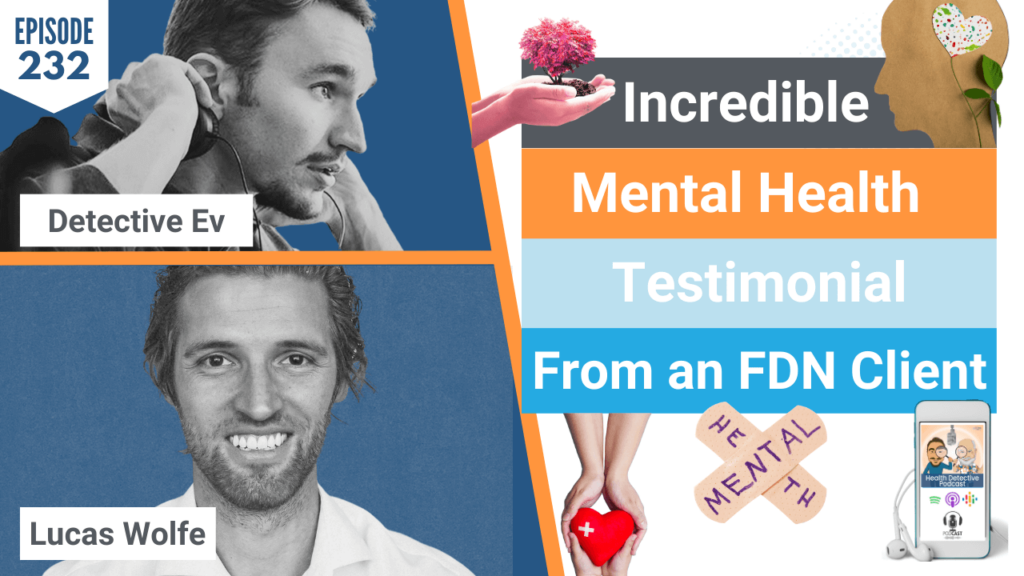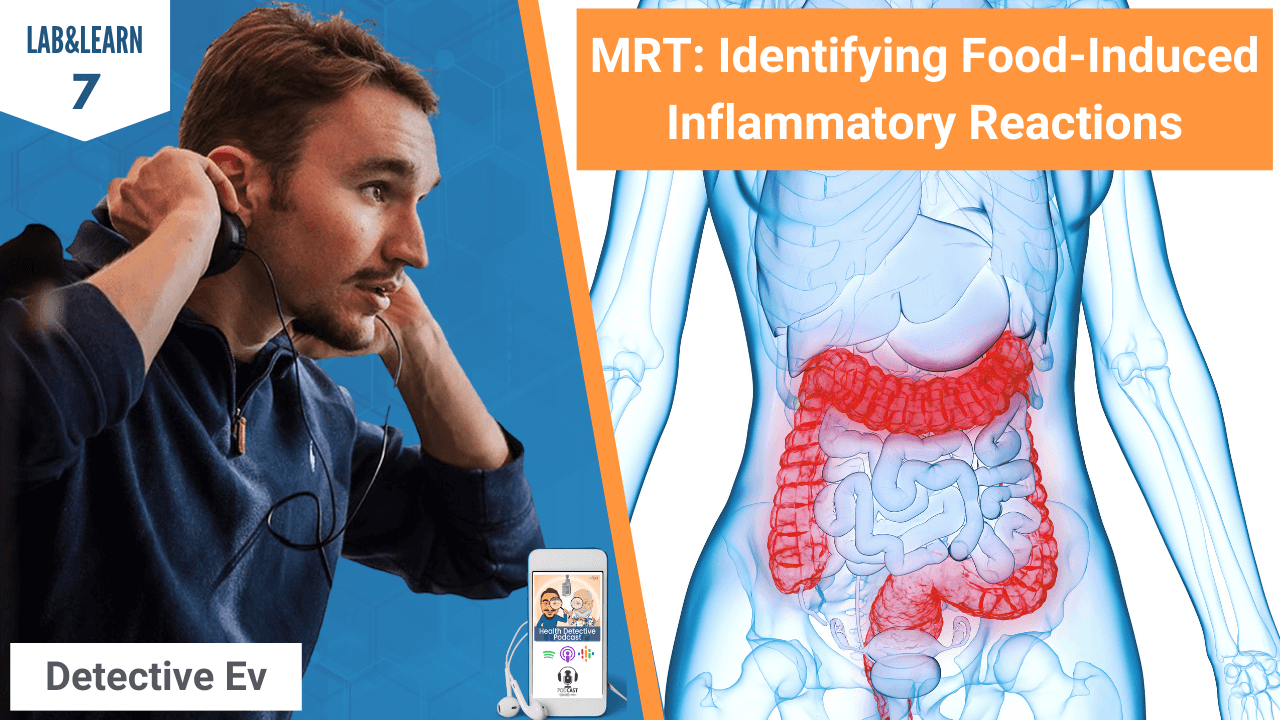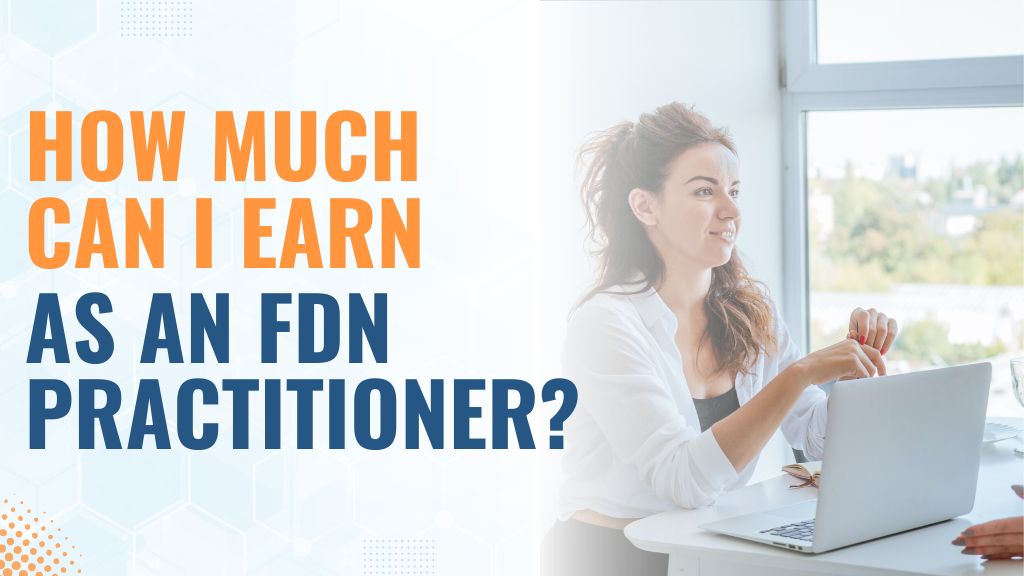Introduction
[00:00:00] Detective Ev: What is going on, my friends? Welcome back to another episode of the Health Detective Podcast by Functional Diagnostic Nutrition. My name is Evan Transue, aka, Detective Ev. I will be your host for today’s show about a mental health testimonial.
Well, this is probably, and hopefully my final wisdom tooth update. As you can hear, I’m sounding a lot better, feeling pretty good. This is an important lesson for people out there that I’ll keep really short, but it’s just something to advocate for yourself with.
We are not against Western medicine. Just in case this is your first time listening to the show, we’re not against Western medicine. However, when I got these three wisdom teeth removed recently, I was told I needed antibiotics. I was actually told on two separate occasions I needed antibiotics.
All I did, I didn’t say no, I didn’t say I’m never taking them. I said, are there any other options? Is there any possibility that I don’t need to take this and I can do something else? Both times the answer was yes, and so I didn’t end up needing antibiotics with this surgery. You say, well, it’s a course of antibiotics, who cares?
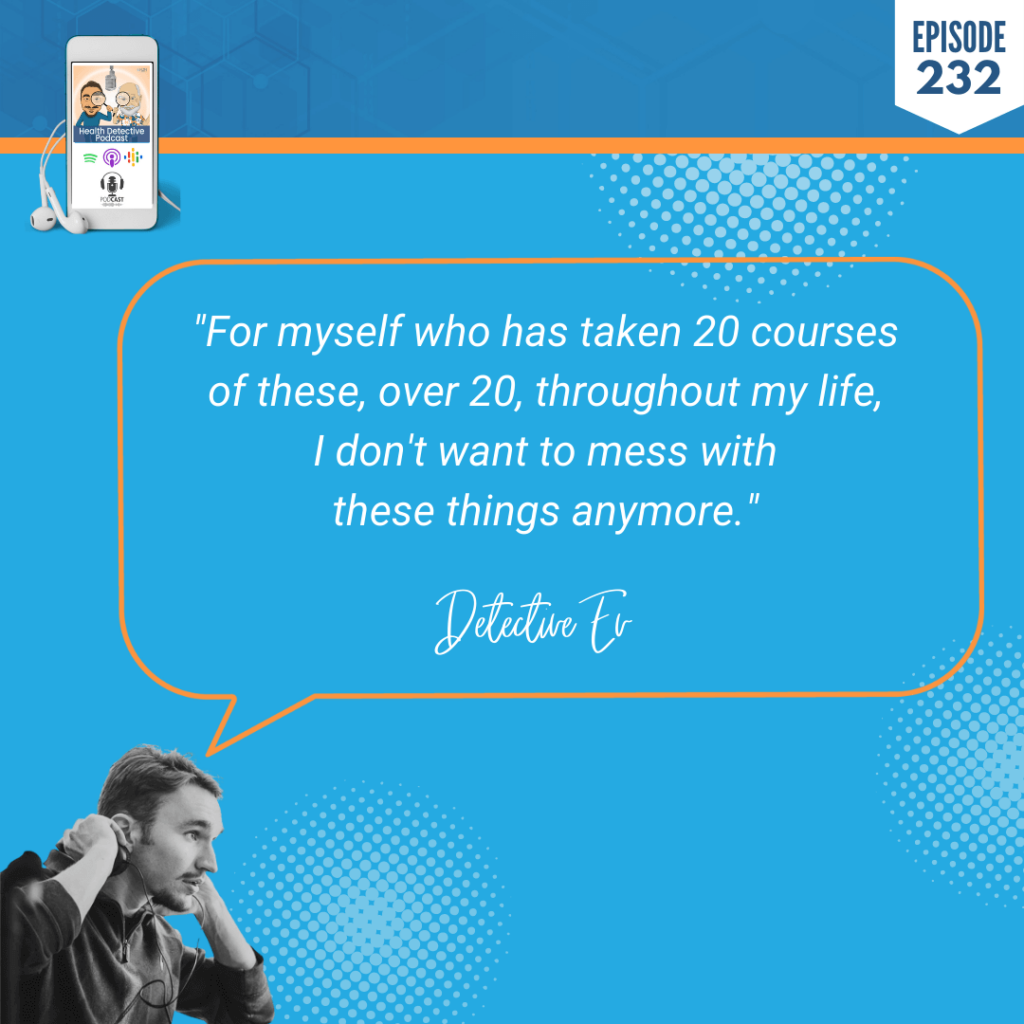
Well, for those of us in the functional space, we know first of all what this can do to you sometimes when you’ve taken these before. For myself who has taken 20 courses of these, over 20, throughout my life, I don’t want to mess with these things anymore.
Final Wisdom Tooth Surgery Update
I feel depressed typically for anywhere from six months to a year after taking them, which is terrible. My skin erupts, and I already knew I was going to have some minor skin issues with the surgery itself and all the other things that was coming with the ibuprofen I’d have to take. Because of this, the last thing I wanted to do was add on antibiotics to all of this, and it turns out there were alternative options.
If you’re not living in a healthy state like an FDN would, this might not work for you so well. And if you are still actively dealing with a lot of symptoms, this might not work as well for you. But I’m just saying, ask; advocate for yourself. See if it’s okay, because I wasn’t going to do something that the doctor said to not do.
But both times they were actually quite open to this. And once I told them my story about having been on all these courses and what it did to me, they said, okay, yeah, no problem. If you feel like you’re getting sick or you feel like the pain’s getting worse at all, please take them. But if this stays the same or gets a little better over the next several days, feel free to do what you gotta do.
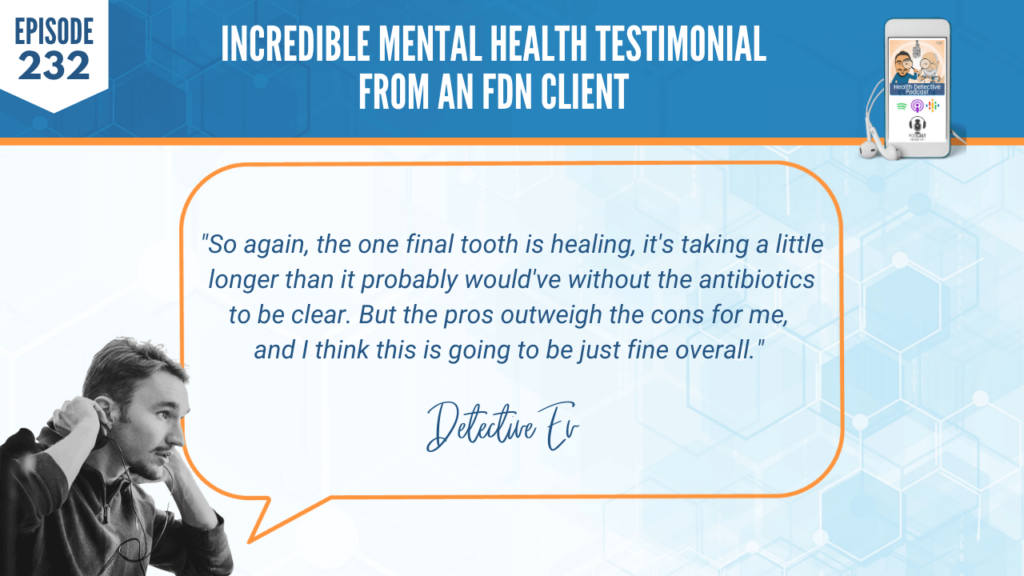
That’s awesome. It worked out really well. So again, the one final tooth is healing, it’s taking a little longer than it probably would’ve without the antibiotics to be clear. But the pros outweigh the cons for me, and I think this is going to be just fine overall. With that said, again, my final update for the wisdom tooth thing, we’re not here to discuss that today.
Mental Health Testimonial: Symptoms Regardless of Decent Lives
What we are here to discuss is the story of my friend Lucas. Really cool. And you’ll hear most of this on the podcast, it was a longer one. I won’t go too deep into the intro today. But I met Lucas through an organization we were both speaking for at one point for mental health issues. He had been through a lot of stuff himself and so through this organization we spoke primarily to kids. Sometimes we were speaking to adults as well.

Basically, you’re just sharing your story and encouraging people to get help. You’re encouraging people that it is okay to deal with these types of problems and you’re not weird or crazy or anything like that for going through these things. I met Lucas in this program. Lucas and I relate a lot because our stories kind of start out similarly in that we both grew up in a very similar area. We both felt, perceived at least, that we had decent lives, and yet we dealt with these mental health symptoms.
Because of this there was a lot of rejection of ourselves around these symptoms and these feelings, invalidation. But Lucas was interesting because when I noticed this, I’m like, well, wait a second, I believe I can help this guy then. Not because I’m so great, but just because of the stuff that I know with FDN and holistic health, and I wouldn’t say that about everyone in the organization.
Some people had been through severe trauma and abuse. I’m not going to sit there and say, oh yeah, eat well and take some lab tests and everything’s going to be fine. That’s insulting. That’s an incomplete form of treatment for those types of individuals.
Mental Health Testimonial: Wanting to Share His Story
But then again, what about people like Lucas and I, there’s gotta be some cause to this stuff. If he’s dealing with this and he had a good life as proclaimed by him, there’s gotta be something else. Unfortunately, it took almost five years for this guy finally to run some labs with us and we started out on super basic stuff. We’ve only gone through metabolic typing and the MRT right now, but the results that this guy got from this is amazing.
What we will do today is we will talk about that. But Lucas, again, has spoken professionally. He’s a very good storyteller and has a powerful message for anyone out there, especially young men. This would be a good podcast probably to share with some young men in your life, or just men in general.
You guys are going to love this one. It’s heartfelt. There’s a lot to this. There’s some pretty serious parts. We’re going to guide you through the story, and then at the end we’re going to talk about the results he’s been getting lately with trying the more natural thing. It shows you guys, it’s never too late. It’s very inspiring for people that have tried a lot of things and haven’t had success. It’s just everything you’d want it to be in a podcast.
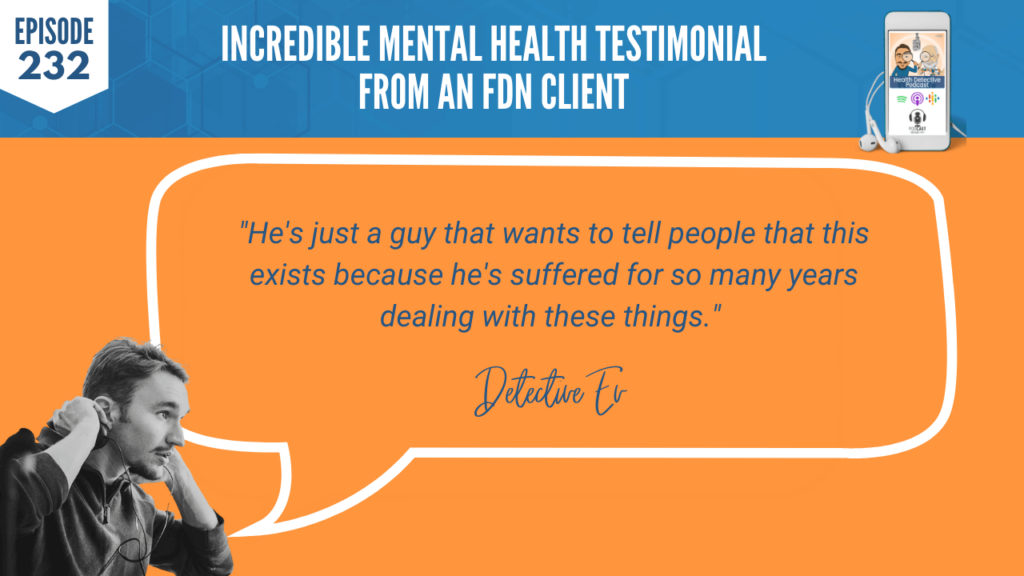
I appreciate Lucas so much for coming on. He has nothing really to offer you guys. Well, he does have a book, but I told him to mention that; he didn’t even want to mention that originally. But he has nothing for sale. He’s not a coach, he’s an engineer. Just a guy that wants to tell people that this exists because he’s suffered for so many years dealing with these things.
Mental Health Testimonial: Similar Stories
Without further ado, let’s get to today’s episode.
Alright. Hello there Lucas, welcome to the Health Detective Podcast. How are you my friend?
[00:05:18] Lucas Wolfe: I’m good, Evan. Good to see you. Thanks for having me.
[00:05:20] Detective Ev: Yeah, this is exciting. I would’ve already had said this in the intro to the audience and stuff, but they know over 230 episodes now, I do bring on, occasionally, people that I know personally. But I try not to prioritize that unless it’s very legitimate, right? I never want to be one of those people that just brings on people because I know them. I like to bring them on cause they have real stories and real things to share with people.
What’s cool about this episode today is you guys know we typically are story based. We’ll start off with the journey that someone went through and then we might spend half of the time talking about the resolution with the natural stuff. But the reason I invited Lucas on is not necessarily because everything’s perfect or a hundred percent figured out, or he has been doing the health thing for 10 years in the way that we do the health thing that is. Certainly not to suggest that there’s been a lack of effort over the last 10 years, there definitely has.

But Lucas is interesting because when I first met him through, well, we can’t mention the organization outside of this, but five, six years ago we met. When I first heard his story about mental health, I’m lighting up in my brain. I’m like, oh my gosh, this dude’s like so similar to me. It’s probably going to be impacted positively by a lot of the stuff that I learned.
Mental Health Testimonial: Pretty Easy Life Before Age 16
But for those listening, you know how hard it is to talk about these things really, if people haven’t heard of this stuff. And Lucas is a smart guy. I mean, he’s an engineer. But if you haven’t heard this alternative type of stuff, it can sound a little crazy. We’ll get into that later and what you’ve been experiencing recently, cause I just think it’s awesome man and I’m glad that you gave it a try.
But I’m more interested in the story, and we’ll focus on that a lot today. Lucas has spoken professionally for years. He’s got a wonderful book and we’ll shout that out at the end as well. For now, we’ll just dive into what he dealt with. So, Lucas, if we can, let’s just start from kind of the beginning with stuff, whether that’s childhood, teenage years, whatever you want to call it.
What was life like right before the mental health issues? Like what had life been up to, and then what started happening symptom-wise that led you to realize, hey, maybe something’s a little off here because it started a little bit later in life for you.
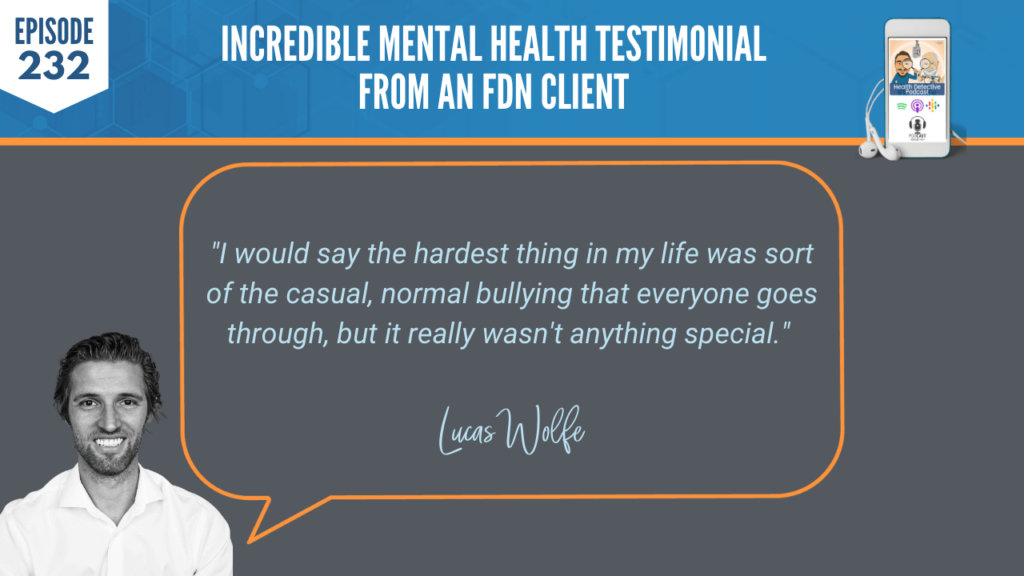
[00:07:22] Lucas Wolfe: Yeah, it did. You know, some people have stories where they recognize it as early as childhood. By childhood, I mean like seven, eight years old, something like that. But for me, I didn’t notice it until I was about 16. Everything before that, honestly, was pretty easy. I would say the hardest thing in my life was sort of the casual, normal bullying that everyone goes through, but it really wasn’t anything special.
Mental Health Testimonial: Didn’t Earn the Right to Be Depressed
But other than that, I mean, my life was a very happy life. I came from a two-parent family. I’m a twin brother. I have a younger brother, Gabriel, with special needs. We’ve always been close. My family was pretty well off, so I don’t really remember ever wanting for anything or ever feeling like I missed out on anything. I always knew that my parents loved me. I went through my time just not being the biggest fan of them like every kid does, but I never doubted for a second that they loved me.
So, my life was really good. It was really comfortable, just easy to be honest with you. Which is one of the things, and the reason I say it like that is because that was one of the things that really made the depression so difficult for me. Because as I’ve said, I just didn’t think that I earned the right to be depressed.

So, when I started to experience those kind of symptoms when I was 16, you know I was about a junior in high school, I really just didn’t understand what was going on. I had no idea what was happening to me; no idea how to talk to anybody about it or even what to say because my life was so good. Like, who is going to believe me? Right? I’m crazy. And that’s really what I thought.
[00:09:11] Detective Ev: The first time I heard that, I was like, whoa, overlap here. I like that you specified why you were saying it that way.
Mental Health Testimonial: Non-Circumstantial Mental Health Issues
Because the stereotypical image of someone still to this day in society that deals with mental health type stuff is someone who has had a circumstance or series of circumstances occur in their life that would lead to something like mental health issues. But then there are actually a lot of people, I would wager millions like me and you, who do feel these things, but we can’t clearly connect it to something else.
And it doesn’t suggest that everything is sunshine and rainbows. I don’t think either of us are saying that. But even your book titled My Perfect Life, How Depression Almost Ended It and How You Found Purpose Through Pain, I always love that. It’s this idea of, okay, my life is good. I don’t think this is justified for the feelings that I’m getting. Some people will take it to the next step and be like, oh, well maybe they were repressing the things that happened to them. You’ve went through all that work, man, this is not an unseasoned person. You’ve been there, you’ve done that; and no, that wasn’t it. There’s something else missing.
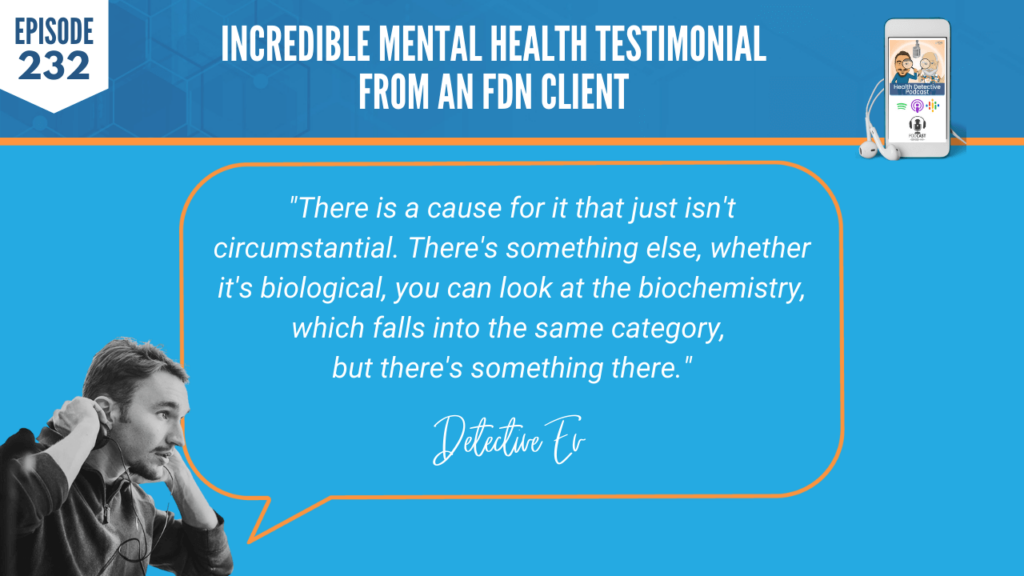
When we deal with that, I’ve always called this, it’s not clinical, but I’ve always referred to it as non-circumstantial mental health issues. There is a cause for it that just isn’t circumstantial. There’s something else, whether it’s biological, you can look at the biochemistry, which falls into the same category, but there’s something there. We live in a cause and effect world. We just gotta figure out what it is.
So, when you were dealing with the first symptoms at 16, what did that look like? What were those?
Mental Health Testimonial: Thoughts of Suicide
[00:10:37] Lucas Wolfe: Actually, for a lot of people, the symptoms kind of build from maybe something like a very strong blue mood to lack of interest to, eventually, if it became severe enough, suicidal ideation. For me, I didn’t follow that typical path. It was like a switch flipped off and I would be perfectly fine, then all of a sudden there would be those images of me taking my life in my mind’s eye, which would cause something like panic attacks.
Again, that just was so bizarre, so unknown to me. This was when I was 16, it was 14 years ago, so this stuff really wasn’t talked about at all. You know, I’m not upset about that, that’s just the way that it was. But I do think that if I had a little bit of education on the subject, that I would’ve felt more comfortable going to my parents and saying like, hey, I understand I have a good life, but these things are happening to me, and I think I need to do something about it.
Instead, I just tried to suppress it, to fight it. I thought, you know, I’m a teenager. Teenagers go through phases, and nobody ever mentioned this phase, this suicidal-thoughts-phase. But I guess that’s just what I’m going through, and it’ll pass. I’ll be fine.

It was easy to convince myself of that because most of the time I really did feel good. But there were times that those thoughts of suicide would come in. I noticed that I also didn’t really like to be alone and quiet, which is something that, reflecting back on, I realized was very much a sign of the depression.
Mental Health Testimonial: No Warning Signs
I always was trying to keep my mind active; I was keeping my body active. I really couldn’t sleep much unless I had worn myself out so much during the day that I just kind of passed out when I went to bed. You know, I was so used to doing that, that I saw that as normal. I now know maybe a better term for that is that it’s not healthy to be doing it that way. That’s not how we should be sleeping. We shouldn’t have to live that way either.
[00:12:51] Detective Ev: Right. This is actually just a question. I don’t believe one way or the other right now, I’m curious though. The way that you talk about when you finally did experience something as severe as the suicidal ideations, there is this justification and trying to explain this away as maybe things that teenagers just deal with or a phase, is it possible that you were going through some early-stage symptoms before this, but it was just completely repressed? Or is it really your understanding that, hey, one day it just turned on for whatever reason? I can buy either. I’m just curious now thinking about it from that perspective.
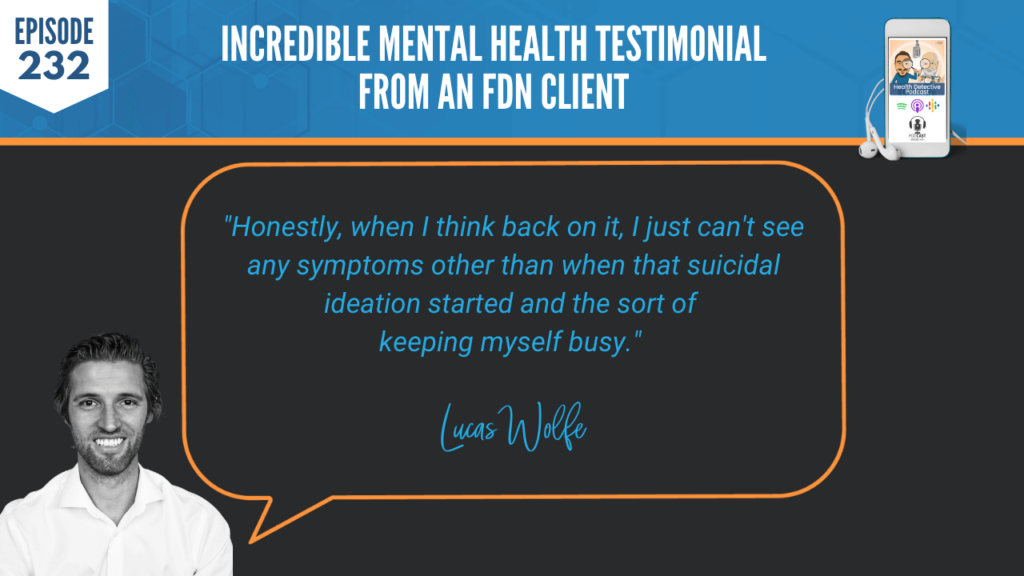
[00:13:25] Lucas Wolfe: It’s a great question. Honestly, when I think back on it, I just can’t see any symptoms other than when that suicidal ideation started and the sort of keeping myself busy. But I was always hyper energetic when I was younger. So, some of that was just being a super energy ball kid.
You know, some of it was the depression and it was very hard to see where that line was when you’re 16 and you got no idea what’s going on.
Mental Health Testimonial: Severe Eczema
[00:13:57] Detective Ev: Fair enough. We’ve definitely never talked about this; did you have any physical stuff as a kid that would be looked at by society as normal? We’ve followed each other long enough that you know what my opinion is on this. Like even the headaches, even the stomach aches, I don’t look at that as normal at all really, especially if it’s happening regularly. Did you have any physical stuff as a kid that might have just been underplayed?

[00:14:17] Lucas Wolfe: Well, I do actually. I do laugh about that now because I’ve seen so much of your work and your posts. So, I had acne; it wasn’t severe, severe, but it was pretty bad. Also, I had the most severe eczema of anyone that I’ve seen in person. It used to be so bad that I would bleed through it. The doctors, when I was in fifth grade, they thought that I had a flesh-eating disease, that’s how bad it was.
[00:14:46] Detective Ev: Wow! We’ve never talked about that.
[00:14:48] Lucas Wolfe: No, we haven’t. We haven’t talked about that. But from seeing some of your posts talking about skin reactions and really how that’s a sign that something’s off in the body, I’ve thought of that myself. I’m like, ah, geez, I wonder if there was something going on all the way back then. I didn’t know. And that’s not how the doctors are really trained. You know, it just got missed.
[00:15:11] Detective Ev: Yeah. Definitely not trained that way. It is actually fascinating to me.
Mental Health Testimonial: Symptoms Aren’t Normal
The reason I went with the physical side, I’m like, all right, anything’s possible in medicine and health, but it is odd. We both know it’s rare to jump to that level of depression or level of anxiety even. Then I’m like, all right there’s probably something else warning us here. And of course, who on earth except very specific types of people that are interested in this functional side would ever even connect something like severe eczema and acne, in fifth grade eczema, with depression symptoms that you’re dealing with at 16.
In my professional experience, I would never be able to predict that that would lead to depression specifically to be clear, I’m not saying that. But when you connect the dots, looking back, I would bet everything to my name that those are not disconnected. The same things that were perhaps leading to those symptoms in fifth grade were actually just the first little trickles going into the mental health stuff later.
I mean, for myself, it was a 13-year experience before I really got to the diagnoses that were starting to really scare me. Stuff that I was told was incurable or I’d need surgery for, or whatever, it was 13 years of dealing with stuff before we ever got to that.
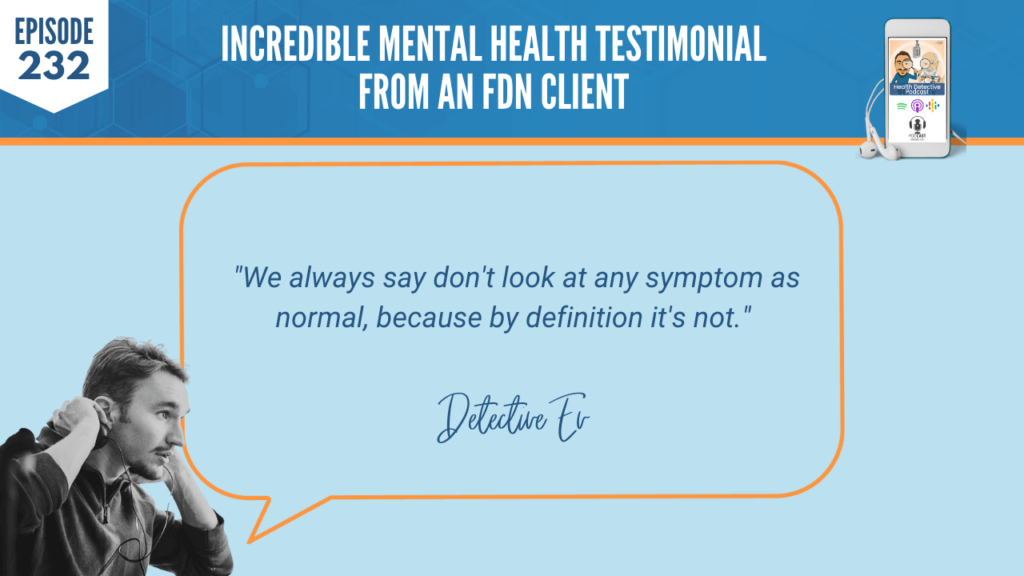
Now is everyone going to be that drawn out? No. I’ve had plenty of people on this show that it’s not the case for them, but there’s usually something that’s going on before we get to the major stuff. So, that’s interesting. It’s just a lesson for everyone. We always say don’t look at any symptom as normal, because by definition it’s not.
Mental Health Testimonial: Connecting the Dots Holistically
And is everyone that has eczema going to get depression or suicidal ideations? No. That’s ridiculous. But it’s a warning sign from the body letting you know, hey, something’s pissing me off right now. We either fix this now or you give me enough time and it’s going to manifest to something else, probably.
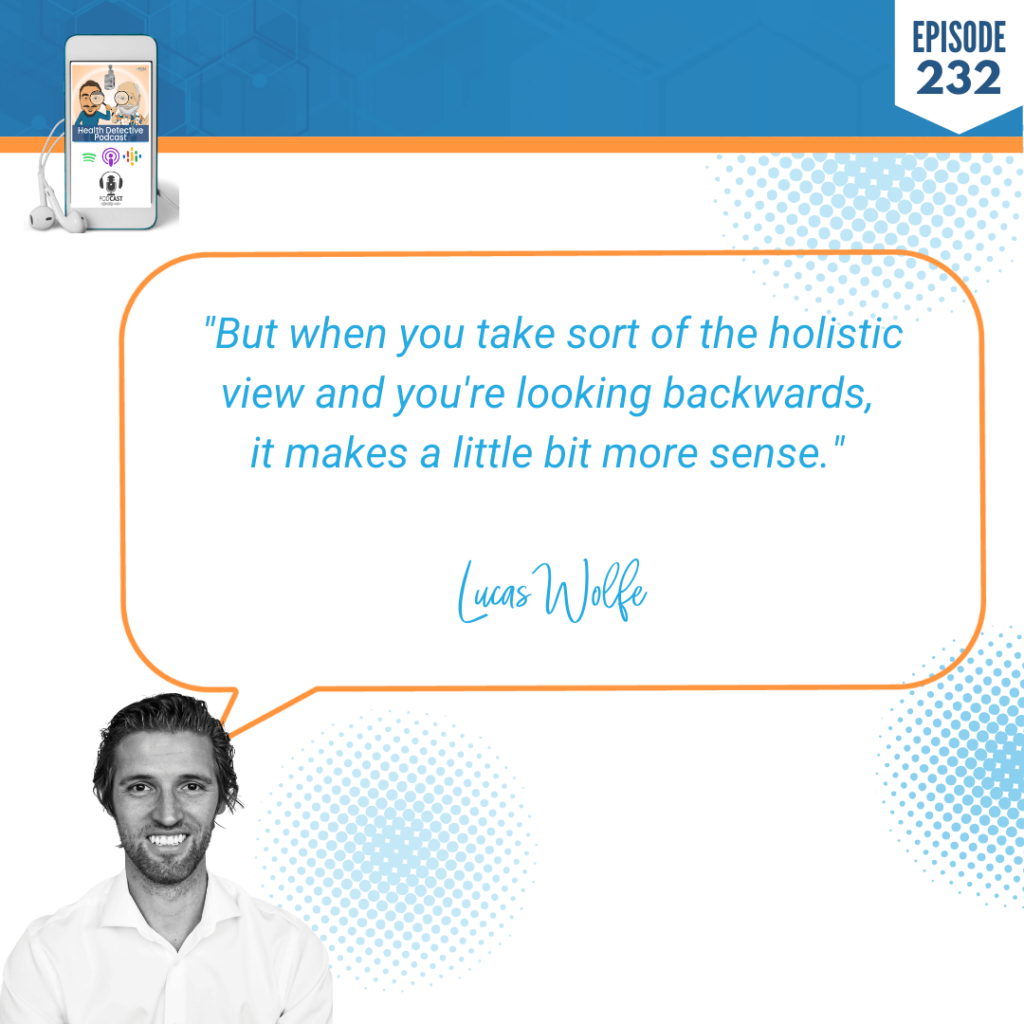
[00:16:49] Lucas Wolfe: Yeah, exactly. That’s a very interesting way to look at it. And that’s why I say, you know, I kind of laugh a little bit now because it’s nothing that I would’ve thought of either. But when you take sort of the holistic view and you’re looking backwards, it makes a little bit more sense.
Detective Ev: Sure.
Lucas Wolfe: Which is great knowledge to have in your back pocket going forward, absolutely.
[00:17:12] Detective Ev: Yeah. Only like 15, 20 years too late.
Lucas Wolfe: Yeah.
Detective Ev: Cool. So, when you were starting to accept these symptoms as part of your identity, just, oh, as a teenager, this is something that people just deal with, I know that there was a breaking point. Of course, I know your story. But let’s talk about between 16 when these suicidal ideations start and that breaking point that occurred, I believe in college, if I remember correctly. How is this going over time? Is it getting worse or is it just kind of this thing that’s lingering in the background?
[00:17:40] Lucas Wolfe: It definitely was a slow burn, right? You know, it started when I was 16 and the breaking point occurred when I was 22. It was a slow burn and it consistently got worse, but it didn’t get worse every day.
Mental Health Testimonial: A Terrifying Belief
Sometimes I was fine, and I didn’t have these awful thoughts, nightmares, or trouble eating. I didn’t have trouble sleeping. There would be things in the back of my mind that seemed to me to be not quite right.
One of the ones that I noticed in my freshman year when I was trying to decide a major and I wasn’t really sure what I wanted to pick, I entered Penn State undecided. I just could not see a future for myself, everything was just black. What really terrified me about it, and I stopped taking time to think about my future, is I understood that part of me believed I wasn’t going to live very long and that’s why I couldn’t see my future. That was such a terrifying prospect that I couldn’t even deal with it.
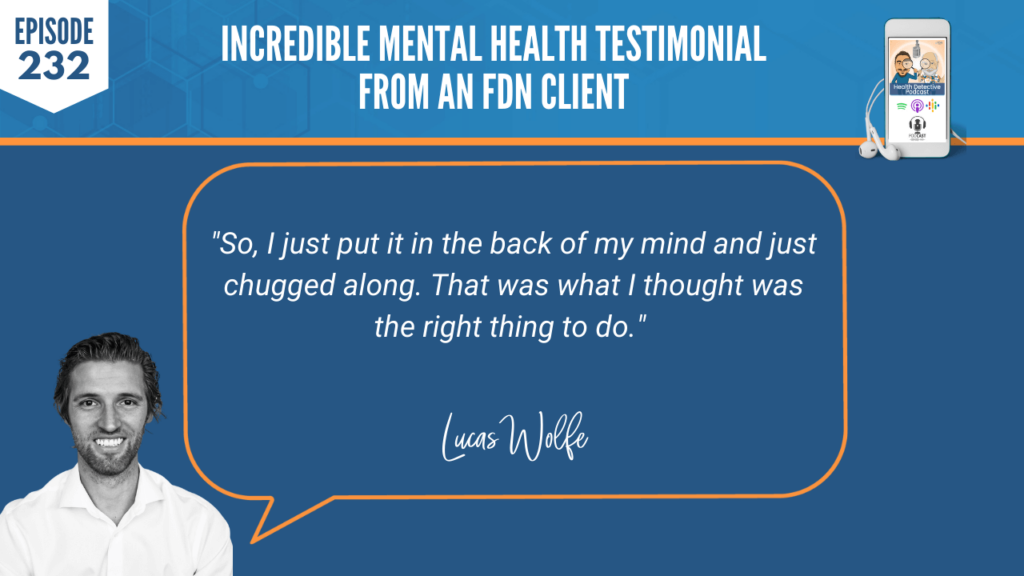
I couldn’t tell anybody about that, couldn’t deal with it myself, couldn’t confront it. So, I just put it in the back of my mind and just chugged along. That was what I thought was the right thing to do. There was certainly some ego involved. I don’t pretend that I had no ego. I was a bit of an egomaniac, so there was certainly some ego involved.
[00:19:10] Detective Ev: That’s interesting. I can’t picture you like that. I didn’t mean to cut you off, but it’s a compliment. I’ve never perceived you like that at all. So, something worked.
[00:19:16] Lucas Wolfe: Yeah. You know, I was younger and that’s just the way that I used to be. But I also really did believe that this was the right thing. I was like, I have this good life; I can’t throw it away.
Mental Health Testimonial: An Entirely Foreign Concept
That was also really when sort of the little bit of victim mentality seemed to be kind of becoming culturally mainstream and it just didn’t sit well with me. I didn’t want to be part of that. I thought that some of what was going on in my head was maybe some part of me trying to get attention through this sort of victim mentality. Like I said, I really believed that I was doing the right thing, just sort of pushing that off to the side, fighting it and moving forward. Obviously, I learned otherwise.
[00:19:59] Detective Ev: Right. Wow. Yeah, you’re just kind of rejecting yourself at all angles there.
When you’re in college, cause 22, you’re four years into college, you’re obviously getting educated. Penn State, for those that somehow don’t know is in Pennsylvania and it’s a great place. A lot of people go there, especially from the area that Lucas and I live in. I mean, I think they have like 50,000 students just on the main campus some years, let alone all the other satellite campuses that they have. It’s a very popular school, very good school.
But my point is, you’re getting educated. Even if you don’t think it’s valid, are you connecting yet the idea that, hey, this is a mental health thing, this is a depression thing, or is this still just, oh, feelings that I have?
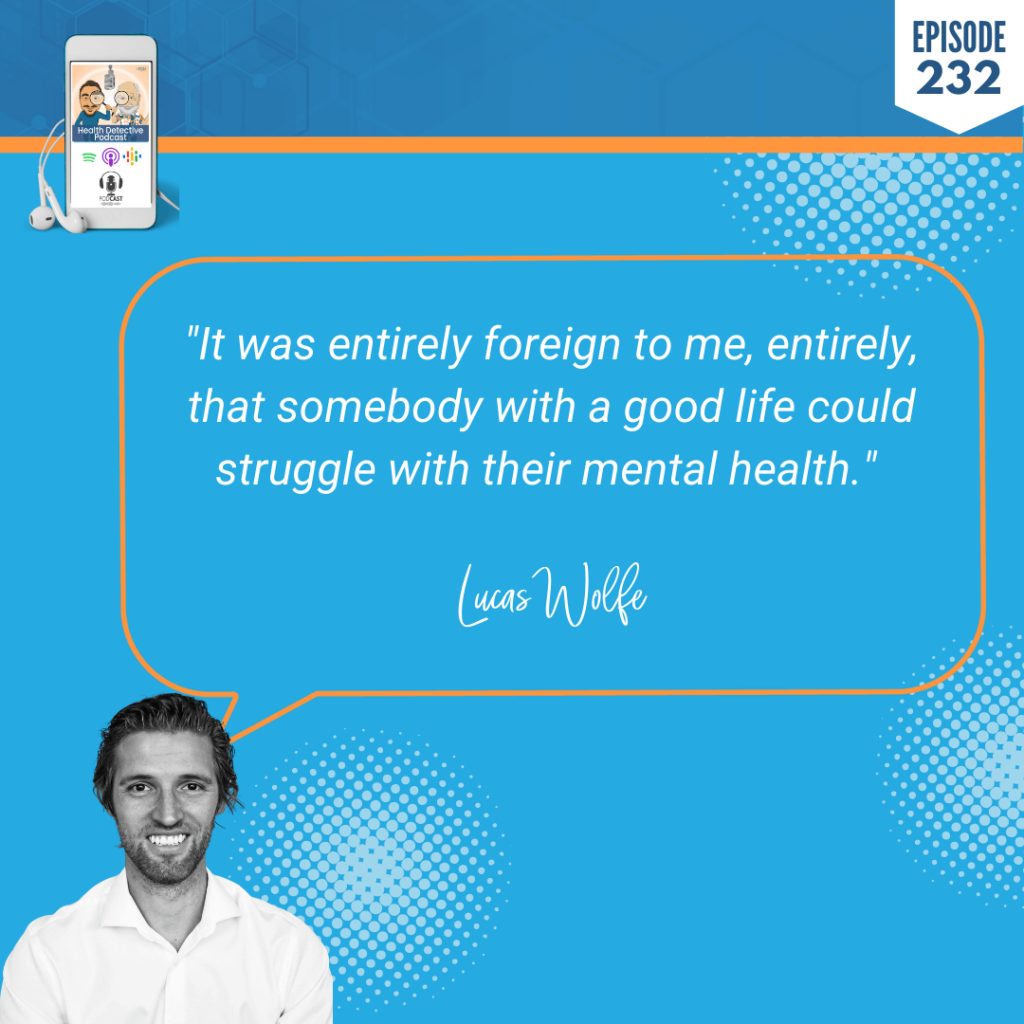
[00:20:37] Lucas Wolfe: I had no concept that this might be a mental health issue. Zero. It was entirely foreign to me, entirely, that somebody with a good life could struggle with their mental health.
Mental Health Testimonial: Not Telling a Soul
I was such a laid back, easygoing, fun guy that the thought of me being depressed or anxious, yeah, I mean, it was diametrically opposed to my character. So, it didn’t even enter the realm of possibility, which was why the easier explanation was I’m crazy and I certainly don’t want to tell anybody that I’m crazy.
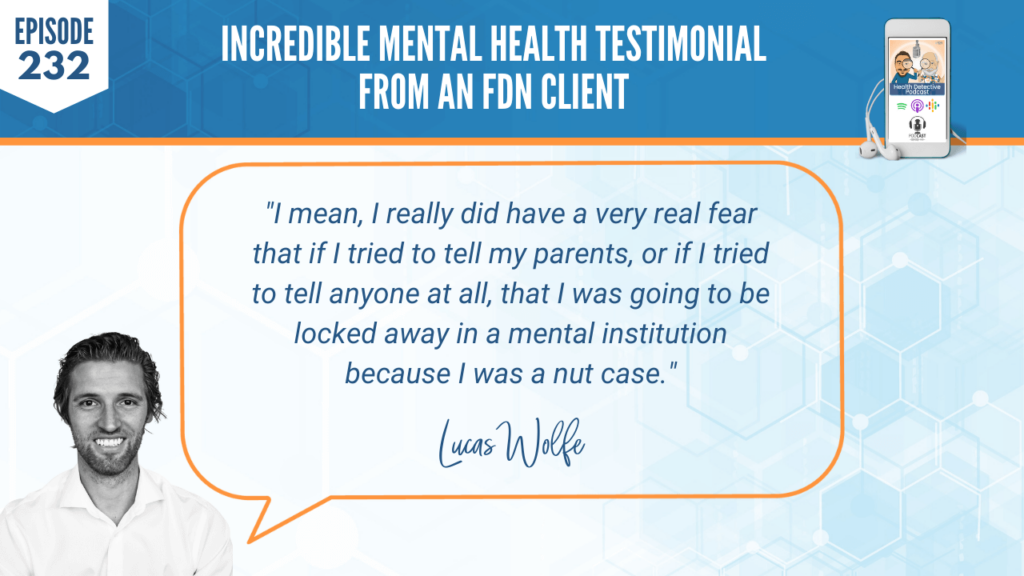
I mean, I really did have a very real fear that if I tried to tell my parents, or if I tried to tell anyone at all, that I was going to be locked away in a mental institution because I was a nut case. Nobody wants that to happen. I didn’t want that to happen. So, I just kept hoping that these feelings would go away.
[00:21:38] Detective Ev: I get you man.
You already know this part of my story, crazy is the word that I used, especially with the panic attacks. Because panic attacks to me, I could be fine one minute, and then for 20 minutes I convinced myself for like the hundredth time that I’m going to die. I, 100%, believe it even though I’ve been through this, again, a bunch of other times. Then afterwards I’m fine, I’m tired, but I’m fine.
That to me was the definition of crazy. I mean, how could, one second, I believe that I’m going to die, and then the next second I’m totally fine and realized, oh yeah, you dealt with this a bunch of other times. Remember those? Nothing ever happened and you were totally fine afterwards. That seems crazy to me, at least at the time that was the perspective. So, it’s interesting.
Mental Health Testimonial: No One Was Taking About It
You touched on a few things that I want to just review for people before we kind of move on to the breaking point and when things got worse, but then eventually, of course, got better, which is awesome.
One is this idea of what was actually going on in terms of the conversation around this 15 years ago, 20 years ago. I think we forget that pretty rapidly, like even the adults in our lives. Now it seems like we talk about mental health all the time. But I remember being in school. I mean, you’re 30, I’m 27. When I was in school, I think I had like a suicide speaker in high school one time, like very focused just on suicide, you know. Then everything else, I don’t remember anything about that.

No one came in and talked about anxiety. And no one came in and talked about the other 20 symptoms of depression that there can be outside of suicidal ideation let alone the 100+ mental health issues that we know of that are out there. They just didn’t talk about any of that stuff.
If no one was talking to us, certainly no one was talking to our parents unless they happened to choose that career path. So our parents, all great people, God bless them, but my parents didn’t know anything about mental health. They didn’t have any concept of this either. So that’s one thing to recognize.
And two, you mentioned two very specific things that I think challenge even the narrative of what depression could be. It’s just worth revisiting really quick. You talked about how you weren’t eating. You said that pretty quick, but you said that you weren’t eating sometimes, like having trouble with the appetite.
Mental Health Testimonial: The Life of the Party
Then you also mentioned something that in many people’s minds would seem like the opposite of what depression is. If you’re trained in this stuff, you know, it can present in different ways. You talked about how you actually couldn’t be alone when you were depressed, where the movie image of this is someone who only wants to be alone and doesn’t want to be around other people.
It just goes to show, I mean, depression can manifest really differently for different people.
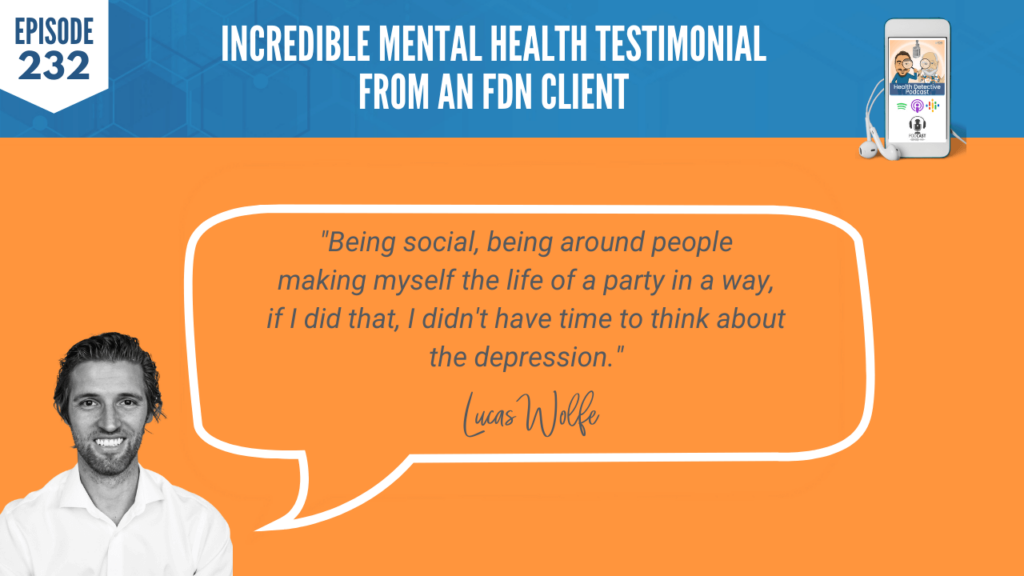
[00:23:58] Lucas Wolfe: Absolutely. It was like a medicine for me. Being social, being around people making myself the life of a party in a way, if I did that, I didn’t have time to think about the depression. I didn’t have time to think about the dark feelings that were progressively getting worse and seemed to be haunting me more and more often. It was an escape, and it was a healthy escape.
It was interesting, because again, I knew that I was doing that in the same way that I absolutely knew I couldn’t do drugs in college. I just knew it. Somehow, I knew that if I started on drugs, I was done for. The absolute certainty with which I knew that, led me to believe, like, I know something isn’t right with me, but I still don’t know how to talk about it. That just kind of worked out, right? Cause I don’t recommend anybody does drugs. I had a very good reason to stay away from them because I was just so certain that would be the end of me if I did that. But that was a real sign.
Mental Health Testimonial: Depression Doesn’t Always Look the Same
[00:25:03] Detective Ev: Right. So even that kind of challenges it because I chose substances with this stuff and so do many people. And you’re like, no, I shouldn’t do this.

So just, guys, keep an eye out. We’re better at this, I think, in the functional space, thankfully, but still, we don’t want to have stereotypes necessarily of what this stuff can look like. It can look a variety of different ways for different people, especially between male and female, depression can look a lot different.
So, I want to talk about kind of the big moment for you here, because this is something that I think, especially for people who speak, seems to be universal, where there is like a profound moment where life is like this up to here and then it is completely different afterwards. Whether it’s good or bad in the moment, it exists, and it’s a profound moment.
What was that for you that led to actually recognizing this stuff or getting help, at the very least, and then recognizing this stuff?
[00:25:50] Lucas Wolfe: That moment for me was in my final semester at Penn State. Just a little background leading up to that. I always believed that there was something just over the horizon that was going to fix me.
Mental Health Testimonial: Spiraling into Bad Shape
When I was a teenager, it was like, this is a phase of adolescence. This’ll pass once I get out of being a teenager. And then it was, you know, that didn’t go away. In my senior year of college, it was like, okay, I’m stressed about college. When I pick a college, I’ll be fine. That worked out, so then it was, when I pick a major. When I picked a major, it was, well, I don’t know if I can make it in this, this is a really hard major. I did chemical engineering, and I was just barely passing.
Even if I do graduate, I don’t know if I can make it in a job. In my mind it was like, I need to be able to graduate and get an internship. If I can do those two things, then I’ll be successful, and all this fear is going to go away. I ended up getting an internship after my senior year and had one extra semester to go. So, I did four and a half years to graduate college. I got an internship going into that summer, and also passed all the rest of my difficult engineering classes.
So, for all intents and purposes, I had graduated. I just had a couple of easy credits that I had to tie up in that last semester, and I had that internship. The internship was off in New Mexico. Things really spiraled there, especially because I was isolated and alone. And I was really already breaking down when I got there.
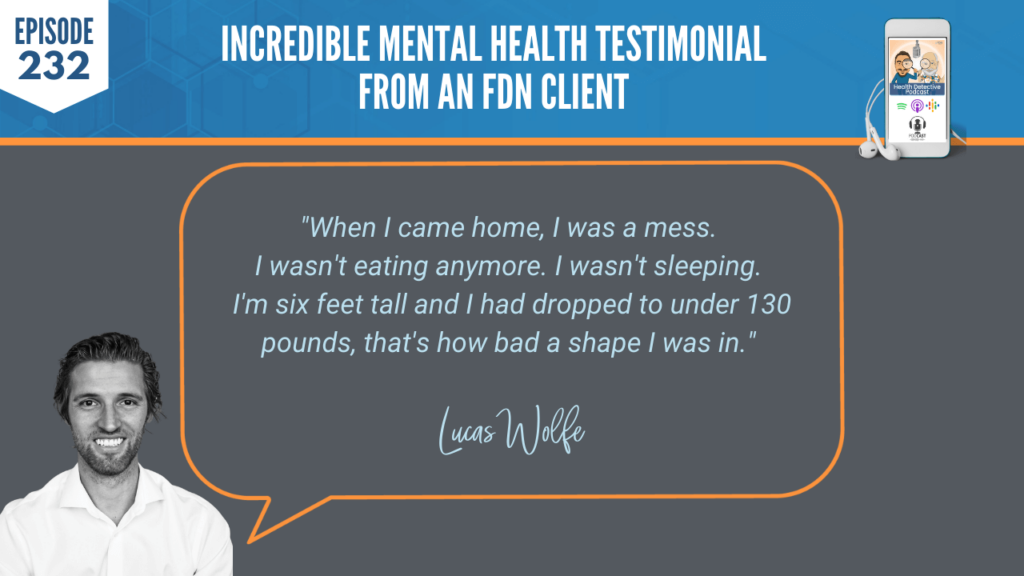
When I came home, I was a mess. I wasn’t eating anymore. I wasn’t sleeping. I’m six feet tall and I had dropped to under 130 pounds, that’s how bad a shape I was in.
Mental Health Testimonial: The Breaking Point
About five days into the final semester at Penn State, I hadn’t eaten anything in two days. I just told myself, I’m going to eat this bagel this morning, and that’s it. I’m going to eat it; I’m going to win. Whatever this thing is that’s going on with me, I’m done with it.
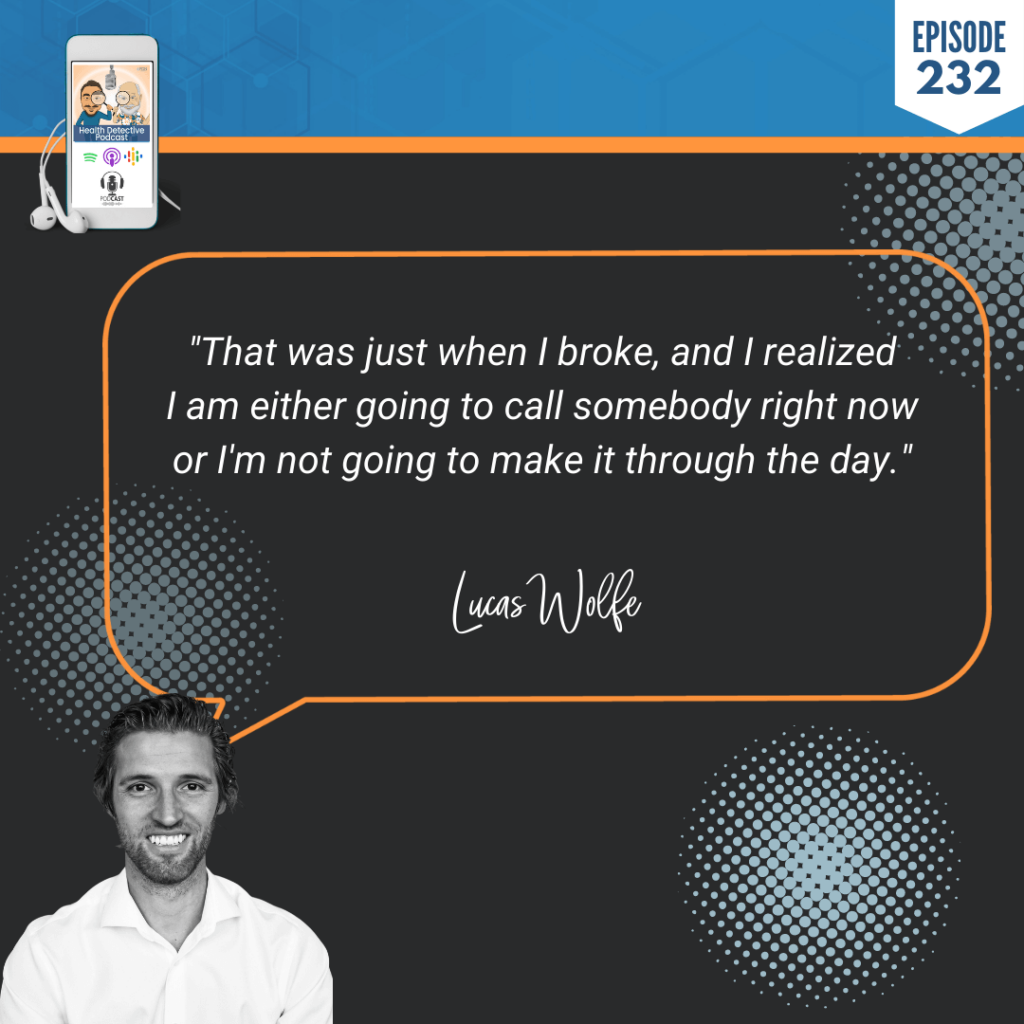
I tried to take a bite of the bagel and my body just started to try to throw up but there wasn’t any food in my stomach. And every time I tried to take a bite of this bagel; I just would start gagging. And that was it. That was just when I broke, and I realized I am either going to call somebody right now or I’m not going to make it through the day.
I got up and went outta my apartment. I gave my dad a call at seven in the morning on a Wednesday at college. He knew I wasn’t calling to say, hey, how’s it going? Seven in the morning was kind of early for me still. So, that was the breaking point.
[00:28:39] Detective Ev: I actually appreciate us revisiting this. I don’t know if it’s because we have a network of speakers, but I actually mixed up the story. I didn’t think that’s what actually led to this.
That’s powerful cause there’s a simplicity to this. We’re talking about eating a bagel. But there’s something obviously wrong that even you trying to protect yourself in a way from this but rejecting the validity of it through all these years; you can’t ignore this. It’s like, dude, I haven’t eaten in two days. I can’t even eat this. Like, something is clearly there. It’s just sad that that happened, but I’m glad that it led to something good.
Mental Health Testimonial: A Conversation with Dad
So, when you called your dad, if I’m not mistaken, this part, I feel like I do remember, this was still not necessarily connected to mental health, right? It took a few days before we realized, okay, this is still a mental health thing that’s connected to all of this.
[00:29:25] Lucas Wolfe: Yeah. Which is, I mean, it’s almost embarrassing, right? Because it was so obvious but I still had no idea what was wrong.
I remember calling him and you know, I planned on just having a conversation and telling him, something seems off. I think I need some help. He answered the phone and there was obviously a note of concern in his voice. The strangest thing happened, but I just broke down, man, and I just started crying. I mean, that’s really unlike me. Normally, I would not cry. And I especially would not cry in front of others probably most of all in front of my dad. So, it had to be bad for me to start doing that.
I just told him that I was sad, and it didn’t make any sense why I was sad. Obviously, I didn’t understand why I was sad. I explained it was more than just sadness, but I didn’t know what to call it. Then I told him I wasn’t eating; I wasn’t sleeping.
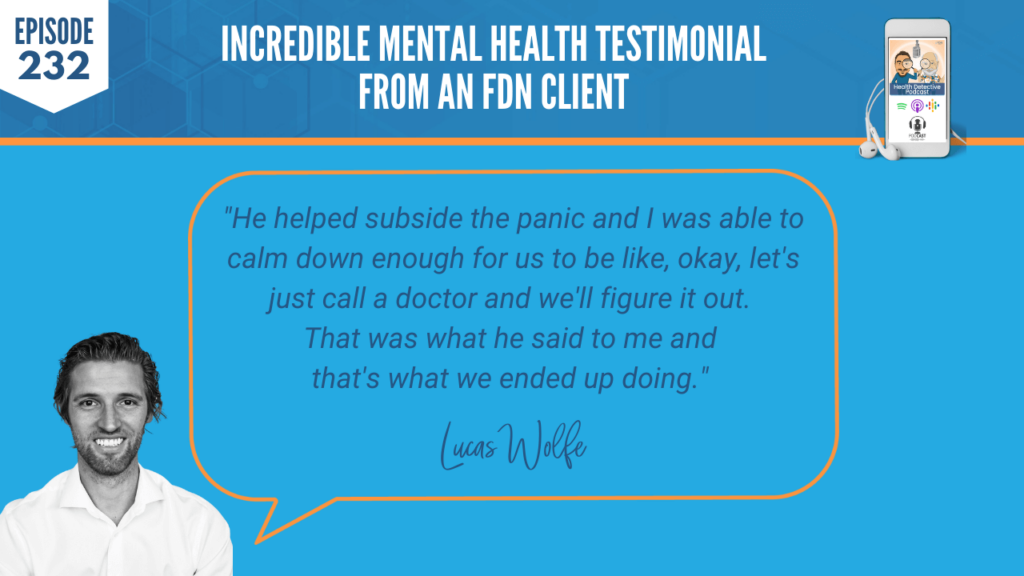
He didn’t jump right to depression either. He kept a cool head and we talked. That really helped me to at least feel like, you know, subside the panic in that moment. He helped subside the panic and I was able to calm down enough for us to be like, okay, let’s just call a doctor and we’ll figure it out. That was what he said to me and that’s what we ended up doing.
Mental Health Testimonial: A Way is Made for Help
[00:30:51] Detective Ev: So, how long does it take you to get into the doctor and what does that consultation, session, whatever, look like? Is that where things got recognized?
[00:31:00] Lucas Wolfe: Yeah. So, I got really fortunate with that. We understood at the very least that we needed to call a doctor.
Now I hadn’t been to a doctor in a long time. We actually ended up calling my old pediatrician and just told him what was going on. We asked if he knew anyone. He was like, yeah, what’s going on is definitely a mental health thing. You know, you’re 22, you’re living a good life and you’re in college. This shouldn’t be happening. That wasn’t with judgment, that just was definitively, this is a mental health thing.

He knew a psychologist and I got very fortunate. The psychologist had availability for me, and I ended up seeing him like within a week at this moment. Looking back on it, if I knew then what I know now, I should have gone to the hospital and gotten immediate help. Because I really was not in a good place for those couple days. I shouldn’t have been trying to make it through that week. But that’s said and done with.
[00:32:05] Detective Ev: Yeah. Well, we’re just glad you’re here. That’s the thing is like, these calls are powerful, but it doesn’t necessarily fix like the eating thing right away. I mean, I’m sure there’s some weight off your shoulders, but what did happen that day? Were you able to eat the bagel or something else?
[00:32:16] Lucas Wolfe: Yeah, I was able to get soft foods down a little easier. You know, yogurt, soups, some ice cream, just enough to scrape by.
Mental Health Testimonial: Some Relief & Some Proof
I saw the psychologist and he was able to get me some emergency anti-anxiety medicine. We started on the antidepressants and that’s where all this stuff is really interesting. I know we’ve had discussions about it before. Really, I do believe that I was so far gone in that moment that I really needed medicine to bring me back. I just didn’t have the strength to do anything. Obviously, I needed that anti-anxiety medicine, and I was scared to death to take this stuff, absolutely terrified. I’m not a big medicine person; I don’t like to take it.
I do believe that we’re equipped to heal ourselves for the most part. I think medicine is great, it absolutely helps. So, I’m in no way against it. I just don’t want to take it unless I absolutely have to. And in this instance, I did.
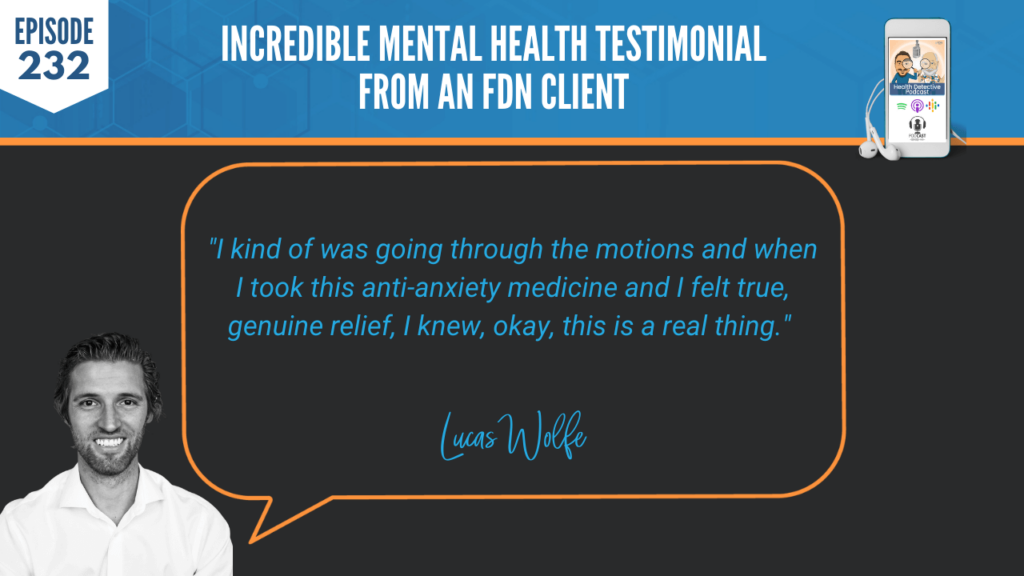
The one thing that was really great about it was I truly believed that there was just no way back for me. I kind of was going through the motions and when I took this anti-anxiety medicine and I felt true, genuine relief, I knew, okay, this is a real thing. It is in some ways chemical and what I just took brought me actual true relief. I’m not high, I’m not outta my mind. I’m not a zombie; I actually just feel normal.
It felt so good to feel that way cause it had been so long since I experienced what it was to just be normal. I couldn’t believe it. When the medicine wore off and the pain and despair of depression was kind of coming back cause the anti-anxiety was just temporary, I had a little bit of hope. That gave me the drive that I needed to keep fighting through this thing.
Mental Health Testimonial: Advocating for the Meds When Necessary
[00:34:17] Detective Ev: I respect this because what sucks about social media is, it’s hard to see what someone truly thinks always, or we assume that they’re putting disclaimers on and stuff.
I would say I rarely get pushback with the things that I share in the functional world. But Lucas, one of the things I do get pushback on sometimes is I actually advocate very strongly for the validity of the mental health medication. People don’t want to hear it, especially in my space, especially that I advocate for it, for kids.
They’re like, you’re outta your mind. I’m like, okay, well, yes, but we’re not playing with an autoimmune disease. Now, some autoimmune diseases are very severe. You have like MS and stuff that can kill someone. Most autoimmune diseases would not kill you so directly. It would be something that you could deal with for decades before passing away if you passed away from it at all.
But my point in mentioning that is there is a certain level of urgency when you’re dealing with mental health stuff, especially in a young person, which at that age, I still consider that a young person. The brain is not fully developed. We’re not thinking as far ahead as we need to think.

It’s not as hard as one would want to believe for one little thing to happen that leads to the story that you just talked about becoming a suicide attempt versus calling your dad and saying, hey, something’s wrong. Like it is a very fine line that gets walked between that stuff. So, far be it from me to ever say that someone should not use medication for this stuff, especially when it worked. How could I argue that?
Mental Health Testimonial: Using the Life Jacket While Doing Investigative Work
That’s what I always just try to really paint the picture for with people and hopefully this story helps them understand that a little bit deeper. What we can also all agree on, especially you’d agree with this now, is we can give the person the medication, but also ask the commonsense questions.
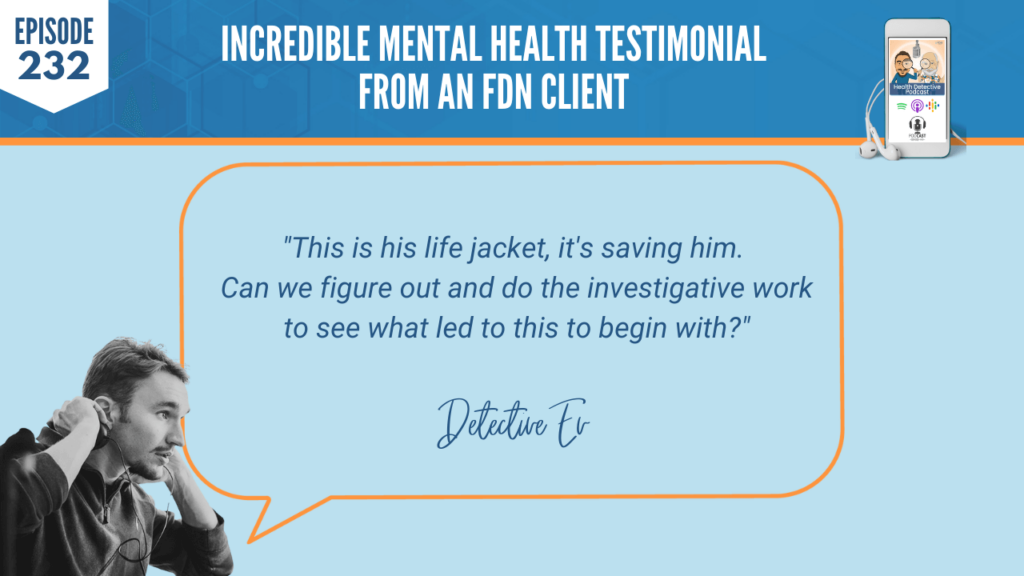
Okay, Lucas Wolf is not deficient in anti-anxiety medication, nor is he deficient in an SSRI. So, let’s let him use this right now. This is his life jacket, it’s saving him. Can we figure out and do the investigative work to see what led to this to begin with?
And of course, the perfect person for you would’ve been like a functional medicine doctor who could’ve prescribed something. But then also, they would’ve made the connection saying like, huh, this guy had some really severe skin stuff too when he was younger. I’m oversimplifying it, but you’d probably make the connections to the gut right away as a functional practitioner, and now you’re looking a little deeper.
We can work through some of that stuff while you’re using the life jacket, no problem. The issue becomes when people get stuck on this stuff for 10, 20, 30 years. We had a young woman on, she was local to us, man. She went to Council Rock South. She was on Prozac from like nine years old to 18. The reason she stopped is because her psychiatrist, at 18, because it wasn’t working for her anymore, illegally prescribed to her a dose higher than the upper end of the limit. Even for herself, she’s like, this is insane. I can’t keep doing this. So, she got into a lot of the stuff that we’re into on this podcast.
Mental Health Testimonial: Meds Uncovered Anxiety Symptoms
That’s actually Courtney Hayes, she’s been on the show before for those wondering. Check that out at Episode 110. But these are common stories. That saved her life at the time.
The emergency anti-anxiety medication, I’m assuming you’re referring to some type of benzodiazepine, Xanax, Klonopin or something?
Lucas Wolfe: It was Klonopin.
Detective Ev: Gotcha. These medications in particular are dangerous, but at the same time, it’ll prove to you real fast that you have a problem or that something’s going on here. That was the same thing that happened to me. Now, unfortunately, it led to abuse, but when I took Xanax, I didn’t get it prescribed by a doctor, but it was at a prescribable dose. I was not taking two milligrams of Xanax. I took 0.25. That is the lowest prescribable dose you could get in this country.

When I took that, the issue was, how good it was for me. The shoulders dropped, the pain in my neck, like stuff I never even connected. The pain in my neck went away. I’m in the shower relaxing, listening to music, it sounds good. Focused, I’m just clearheaded. And that’s great but, again, for me doing it illegally, that was the problem. Cause I’m like, well if this is good, eight times this must be even better. That’s not how that math works just so you guys know from experience.
This stuff does work and I’m glad that it actually helped you validate this experience. I don’t want to put words in your mouth, but it sounds like this is what you meant. You’re saying you took that medication, it worked, and that was the thing where you realized this is a mental health issue. It has to be cause the medication worked.
Mental Health Testimonial: Combination of Meds & Therapy
[00:38:34] Lucas Wolfe: Yeah. It was another really strong notch of evidence that said, you’re not making this up. Which was one of the things that kept me from talking about it for a long time. I thought I was making it up, thought I was trying to weave this woe-is-me story. That’s what I was telling myself.
Depression and anxiety is so interesting and conniving because it’s really an intelligent illness that can lie to you. That’s what it was doing. When I took this medicine and it helped, I said, oh, I’m not making this up. This is real. That helped me to accept it and move forward with it.
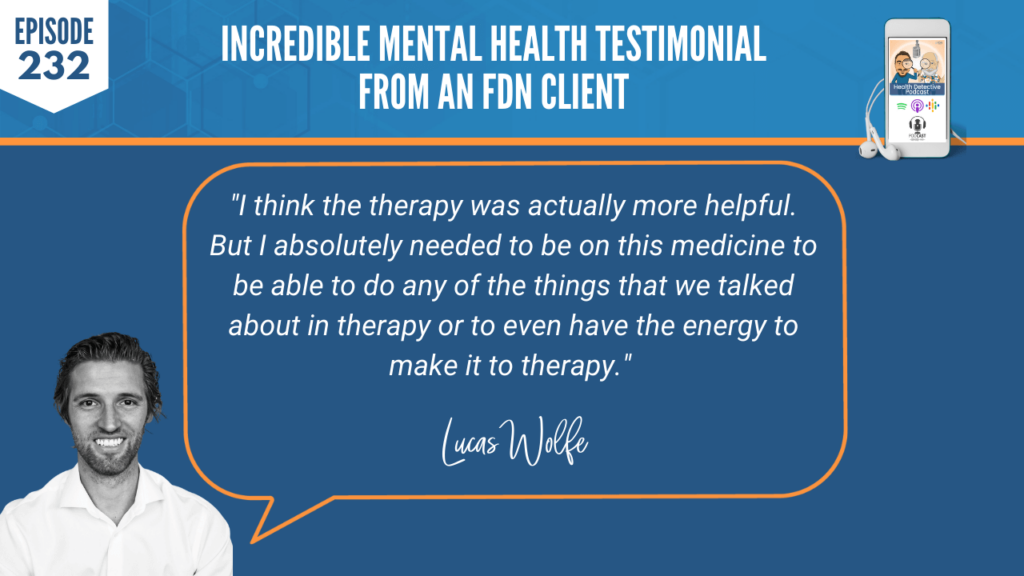
I agree with you, I never claimed the medicine to be this silver bullet. I think the therapy was actually more helpful. But I absolutely needed to be on this medicine to be able to do any of the things that we talked about in therapy or to even have the energy to make it to therapy.
[00:39:41] Detective Ev: I don’t want to oversimplify things today, but I think it should just be looked at as a tool. If I take a hammer and use it to hit someone on the head, that’s a bad use of the tool. If I take the hammer and build a house with it, that seems like a reasonably intelligent use.
Similarly, if I take medication to save my life when I need it, that’s cool. If I take it for three years straight, that particular one especially, the withdrawal alone could kill me at that point. That might not be the best use of the tool. So, it’s just a tool, guys, that’s all it is. We don’t have to be overly scared of it.
Mental Health Testimonial: A Real Fear
Most people, by the time they’ve gotten into our space, have been through so much Western medicine stuff, that’s why I always challenge them a little bit with that. I’m like, you really think the mental health medication, as not good as it is, is really the worst problem when like, this person’s been through chemo, this person’s been on Synthroid for 15 years. We all do the stuff; we all go through it first before we get to these things.
I don’t want to shorten too much of your story, so just please know in the back of your head, there’s nothing wrong if we have to add five to 10 minutes to this podcast. But there’s so much that happened after this, between 22 and 30 years old.
So, before we even talk about some of the stuff you’ve been doing recently, you got yourself to a good place and a good place in mental health means stable, productive member of society, able to live a good life. You have a wife and a kid now. This is beautiful how stuff worked out.
So, after this initial medication kind of being the life jacket, what was the freaking journey like after that? I imagine it was an interesting one.

[00:41:02] Lucas Wolfe: It was. I don’t think I seemed different to people on the outside, but I felt very different. At first, I didn’t like it because there was a real fear. The way that I explained it to my wife was, if you went skiing and wiped out, broke both your legs, your arms and your back, you wouldn’t even want to go near a mountain again, right? That’s essentially what happened to me, except the mountain is life and you can’t get off of it.
Mental Health Testimonial: A Tragic Suicide
There was a lot of fear and I wanted to live slowly is, I think, the best way to describe it. I wanted to work, and I wanted to hang out with my friends, but I didn’t lose. I actively decided, hey, this thing that I did like my whole life where I pushed myself really, really, really hard, I’m going to just put that on a shelf for now. I’m not going to get rid of it forever, but I’m going to put it on a shelf for now cause I don’t think it’s appropriate for this time of healing.
I just worked on the therapy and let the medicine work. Before, I had always been spiritual, but I got into that a little bit more. I prayed a lot. Then I graduated college, got a job, started working, and I was happy. Like you said, it was about stability, and I was stable. I was happy, I was really, really enjoying myself. I felt like I could live this sort of uncomplicated middle-class life for the rest of my life. I’m really happy doing this and I hope that this holds.
What got me into sort of the mental health space cause I had no plans to get into it. I wanted to run as far away as possible from it. All I wanted to do was forget about what happened to me. But there was in the high school that I went to, Holy Ghost in Bensalem, there was a junior who committed suicide.
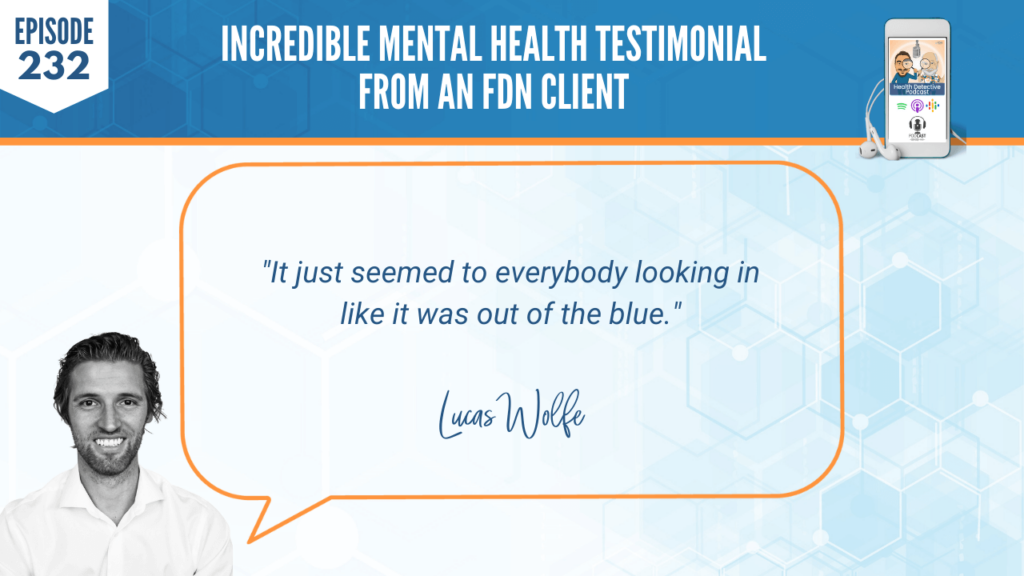
His story was just the same as mine, the same as yours, Evan, the same as so many – no signs, no symptoms, no real warnings, happy guy, good life. It seemed to everybody looking in like it was out of the blue.
Mental Health Testimonial: Sharing the Journey to Help Others
I reached out to the principal who, you know, it was not so long since I’d been there that they still remembered me. He said when I came in and met him, he said he had to do a double take when he read the name in the email cause I emailed him. I said, look, this happened to me and I’m the last person that anybody would’ve ever thought this would happen to. Let me just come in and talk to the kids and tell them that it doesn’t have to be this way.
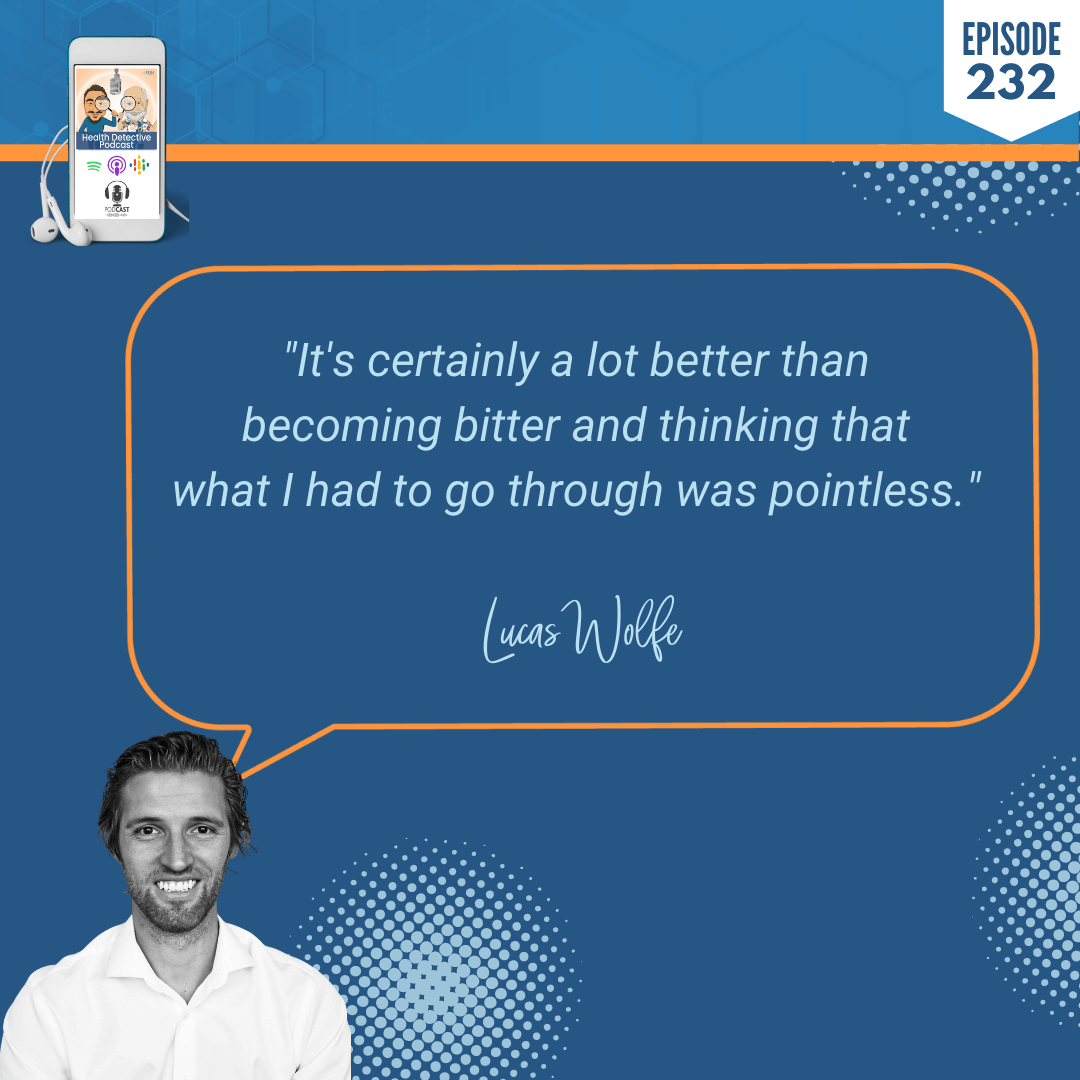
It went really well. I just thought, you know, maybe I had to experience this so that I could tell other people about it. I don’t know. We don’t always get to know the reasons or the purpose for why we go through things, but I thought this is as good a reason as any. It’s certainly a lot better than becoming bitter and thinking that what I had to go through was pointless.
That was something that I realized, you know, it was another thing that was kind of in the back of my mind where I recognized that that was there and if I didn’t ascribe some sort of purpose to what I went through, that I could become resentful and bitter about it. That led me to the organization that Evan and I met at. I went to schools and parent meetings and counselor conferences and just talked about my experience for a couple years. It was really great to be able to do that.
Mental Health Testimonial: Choosing to Turn Pain into Purpose
[00:44:37] Detective Ev: So much of this is so well worded, especially this part. Regardless of whether or not it’s a mental health thing for them, everyone that becomes kind of like an FDN or any type of functional practitioner, man, you’re living a passionate life. This isn’t something that you dreamt about at five years old to go do, but yet you find yourself doing it, and it’s the best work ever. I think there’s a huge lesson there that everyone can take today.
Even if you’re just listening for the sake of interest or understanding, but maybe the mental health thing isn’t actually as personal to you, this idea that you don’t have to know why things happen, but you can create a purpose with it, that’s how I approach it. You know, do I want to believe everything happens for a reason? Sure. You and I share this, I know for a fact, where we would never speak in such an absolute. Like we can say everything happens for a reason, but we’re also critical enough to be like, no, there’s a chance that this is all completely random too, that could be possible. I’m at least willing to humor that.
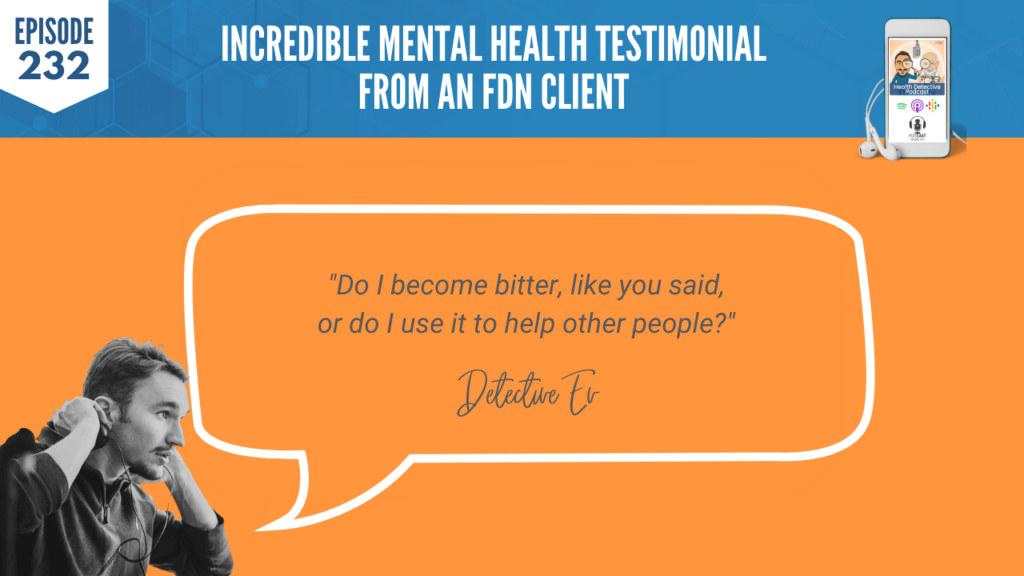
But then the idea is, okay, regardless of whether or not I can guarantee it happened for a reason, what is actually a better application of this experience? Do I become bitter, like you said, or do I use it to help other people? And man, when you get those first things of good feedback, I mean, it could be completely different for you in your job depending on who you are listening right now, but as speakers, it’s obvious.
Mental Health Testimonial: Understanding, Accepting, & Moving Forward
If someone comes up to you and says, I think this just saved my life today, I would go through what I went through a hundred times over again just to do that one time because you can’t buy that feeling.
I’ve done drugs, drugs don’t do that. I’ve made some bad decisions in my life to change the chemicals in my brain, nothing has helped with that. Money doesn’t do it. Love, honestly, as much as I love my girlfriend, it doesn’t even match that. It is something so deeply spiritual to know that there is purpose to your life right now on this earth in a major way.
That’s special and it’s something that we can all apply as people in this space of functional medicine. You take those things that happen to you, and you use it to help other people. It’s a whole different way of living. I’ll just leave it at that.
I’m glad that you got into the speaking thing, man. I know that wasn’t what you set out for originally. We aren’t mentioning the organization itself, but how did you get into that? I didn’t realize that you spoke at your school voluntarily first; I just assumed that you were already a part of the organization.

[00:46:47] Lucas Wolfe: No, I spoke voluntarily at my school first. A counselor there used to be a counselor at a different school. One of his students had joined the organization, so he knew about it. He gave me that contact info and it all just kind of worked out. As much as I was trying to escape thinking about the mental health stuff, I also felt I really needed to understand it to accept it and move on from it.
Mental Health Testimonial: Authoring My Perfect Life
So, I was reading a lot of books about mental health. I’m sure anybody listening to this podcast who’s dealt with health issues, has done something similar where you dive into sort of a deep info gathering moment of your life where you’re really trying to understand what happened to you or what’s happening to you.
A lot of the books that I read made me more depressed. They just weren’t that good. I didn’t think that they really offered hope. They were heavy. They just kind of weighed on me. That’s why, as Evan mentioned earlier, I wrote my book. I didn’t really intend for it to do anything.
It just kind of was therapeutic and a fun project. I thought, you know, if anything, at least maybe it’ll help my family understand what happened to me and maybe they can get some laughs along the way. Then it turned out to do a little bit more than that.
Detective Ev: I’d say.
Lucas Wolfe: Yeah. And I’m very happy about that.
[00:48:09] Detective Ev: So where can people find that now? And then just remind us of the title again, please. I’ll put it in the show notes.

[00:48:14] Lucas Wolfe: Yeah. So, people can find it on Amazon. It’s My Perfect Life: How Depression Almost Ended It and How I Found Purpose Through Pain. It just takes you through my life from high school to the breaking point and then the recovery afterwards and what that was like.
Like I said, I try to keep it as light as I can when talking about this stuff. I try to keep it a little bit humorous. I think that that just makes it stick a little bit more when it’s not so wavy all the time.
Mental Health Testimonial: Doing Basic Functional Labs
[00:48:42] Detective Ev: I respect that. I have, I feel like, a different style. But you know, I think it matters. What I’ve learned with speaking especially, you gotta be in your own style.
Our friend, Jordan, I thought he was going to be like a Tony Robbins type speaker. Then I went and fanboyed one time and watched him at a college, and he’s as calm as can be up there. But it’s so well-crafted and so specific with how he says certain things. So yeah, whatever works for the person cause you’re going to relate to someone in a way that I can’t and vice versa. It’s beautiful. That’s all that matters.
Now I want to spend the last little bit here connecting this all together. It’s like we’ve been alluding to this the entire time, this idea of functional medicine helping to some degree. Again, guys, I can’t stress enough, I asked Lucas to come on because more than a few of you at this point have asked for clients to come on of people that work with FDNs, not just the FDN practitioners or functional medicine doctors themselves. So, you have a client, and you have a well-versed person that has tried many things, the therapies, the medications, all the stuff.

We did some very, in our world, at least, kind of fundamentals, like basic stuff. Maddy, my girlfriend, who was just on, actually worked with Lucas. Man, I was in the other room and was listening to you talk to her. I’m like, no way. I open up the door and I’m totally eavesdropping on this. I let him know I did this because I didn’t want to be rude, but I was like, dude, this is amazing.
Mental Health Testimonial: Trying to Get Off the Meds
So, what happened, basically? What did we discover? What did we look at? And how did it change the feelings for you pretty quickly?
[00:50:03] Lucas Wolfe: Yeah. So, a little bit of background on that. Even though the medicine was super helpful, I had always wanted to get off of it. I just didn’t want to have to take it. I tried getting off of it, maybe four or five times in the last eight years and every time, disaster. You know, I looked into the withdrawal symptoms and how that could make you feel like you were depressed.
So, I fought through that for more than four months and still, just disaster. The last time that I had tried to go off was this past July. The reason that I did that was I didn’t want to rely on medicine because my wife was pregnant. We were going to have our first child, and I just wanted to be fully there.

I convinced myself that I didn’t need the medicine; it wasn’t helping me, yada, yada, yada. So, I weaned myself off. I was off of it for about seven months; everything was golden. Then in January, I started to kind of feel it a little bit and very quickly, by the time I got to February, I was just off a cliff all the way back to the way that it was when I was like 22.
What really did it for me was, my daughter, at this point, was born and I was watching my brother play with her. And I just was thinking to myself, I wasn’t trying to think it, this was very much like the suicidal ideation where the thoughts are just coming, and you don’t want them.
Mental Health Testimonial: Getting the Food Sensitivity Results
The thoughts that were coming into my head was, she’ll be okay. She’ll have a father figure; she’ll be taken care of when I’m gone. I just went home after that and it was devastating, just absolutely devastating. I was like, I gotta do something about this. Evan’s been talking to me about this functional diagnostic stuff forever, and just, what the heck am I waiting for, man? I gotta do this for my daughter, and I want to be around for her life. I don’t want to feel this way.
So, I got in touch with Evan and Maddy. I took the food sensitivity test and got the results. It’s funny man, because when Maddy called me with those results, I know it made no sense, but I was mad at her. She’s telling me all the things that I can’t eat, and I was just mad at her like it was personally her fault that I was sensitive to this stuff.

I mean, it was eggs. I ate eggs every day. Pork was on there. You know, no gluten. It’s like my favorite thing to eat in the morning was a sausage, egg, and cheese on a toasted everything bagel. Maddy was like, no more. A lot of things that I ate all the time were on that food sensitivity test.
It took me like an hour. I got the results, and I just went and sat on the couch. My wife, Erica, was like, are you okay? I was like, ah, I’m fine, except I’ll never be able to eat anything ever again. She was laughing.
Mental Health Testimonial: Getting Quick, Positive Effects
After I got done feeling sorry for myself, I looked at what I could eat, which is actually a ton of stuff and formulated a plan. I started eating those things. I have a fast metabolism, I was a high oxidizer, so a lot more proteins, fatty foods. So, I started eating that. I went on the essential amino acids that Evan recommended. I would take them every day, just dump them in some water and have them. And I started on the supplements that Evan and Maddy recommended for me.
I’m a skeptic. I, 100%, trusted Evan and Maddy because I had seen the results with them and with people that Evan had talked about. I just didn’t think that it would work for me. So, there’s no placebo effect here. That’s why I’m mentioning it.
[00:53:50] Detective Ev: Yeah, definitely not with Lucas. I’ll attest to that.
[00:53:52] Lucas Wolfe: There was no placebo effect. And within about five days, I was like, man, I’m starting to feel better. It was noticeable.

Within 10 days I felt better than I had since I was 15 years old before any of this had started. I mean, I had energy; I had hope; I could sleep and focus. Honestly, I felt like if I ran and spread my arms out that I was just going to take off and fly. That’s how excited I was.
Mental Health Testimonial: Annihilating Another Fear
The thing that I didn’t even really realize until I had done this was that before I had done this, all that time since I broke, there was always this underlying fear in the back of my mind that one day the depression was going to come back and the medicine wasn’t going to be able to fix it, and it was going to win. Ten days into doing this diet, that fear was gone.

I think that’s why I felt so light, so I’ll say, joyous, because it wasn’t as fleeting as happiness is. I realized, okay, there is something that I can do. There’s more that I can do than just take this medicine. It’s clearly real. Cause here I am, and I feel great.
[00:55:19] Detective Ev: This is amazing, man. For whatever it’s worth for those listening, we kind of started with a basic program that we run at our studio. This will make more sense to the audience. We’re not even talking about gut testing, or the hormones, or any of that stuff, even though that’s awesome if you can do that. There’s certain cases where the basics actually work really well because the person hasn’t done anything like this yet.
So, if someone comes to me and they’re like, all right, I’ve been eating organic for 10 years and I’ve been doing the gluten-free thing and this and that, which is a lot of the people that come to us, honestly. Okay, yeah. There’s no way you’re getting away with this without running everything.
But sometimes Lucas makes the best type of client. Because I’m like, all right, I don’t really need you to do much for you to know that this is going to work to some degree.
Mental Health Testimonial: Even After All That…
Those are profound results, but you’re an exceptional client, by definition of exceptional in the sense that most people who end up with people like me or like any of our listeners, they’ve tried a lot of holistic stuff. And for you, this was kind of the first holistic thing that you really like, hey, I’m going to dedicate to this and actually get some objective data to try. So, for me, that story, as relatively short as it is, cause these are new findings, this is, you know, we’re talking a month or two here, that’s worth the entire podcast.

Because it just goes to show, I mean, this is a long freaking time, man. We’re talking 16 to 30, this is 50% of the time you’ve been alive. For a good chunk of that, roughly 25% of that time, you’ve been actively working on it. You’ve been doing this stuff, the therapies, whatever, and this still had this profound of an effect that quickly.
So, is there going to be more work to do? Sure. Are there going to be bumps along the way just like anything? Yes. I don’t want to oversell this to anyone who’s listening. You never know what you’re missing with this stuff. And I think the one thing I would say definitively is if you are a person like myself, like Lucas, or unfortunately like that young man who took his own life at your school, who has an overall good life and you feel like heck and you don’t know why, we live in a cause-and-effect world. There is some cause you just don’t know the cause yet.
Mental Health Testimonial: It’s a Small Sacrifice to Make
There’s usually only two main causes of mental health stuff. You either went through the ringer or there’s something going on biochemically, hormonally, something in the body. It just so happens that our system and many other functional practitioners out there are equipped to look at that stuff and figure out what’s going on. This is something that I’m super passionate about.
I think you would’ve stuck through, especially with your daughter, because I can tell how much you care about her and love her. Actually, I can’t imagine you not being here even if those thoughts were present. I can’t help but sit here and think about how lucky I’ve gotten that I didn’t die when I’m driving around blacked out on drugs in a car at 17.
How many people are dying from this but don’t know that 10 days’ worth of dietary changes could give them enough hope to get through this? That’s where the passion, for me, comes from. It’s one thing to suffer with a health issue, it’s another thing to know that we are losing people’s lives because of this.

[00:58:11] Lucas Wolfe: Right. And at the end of the day, it’s a pretty small sacrifice that I think most people would make in a heartbeat if they knew. Now I’m at the point where I don’t even really miss the eggs that much cause I so much look forward to my ground beef and potatoes. I don’t mean to make light of it, I’m just saying it’s small in the grand scheme of things. What you get for such a small sacrifice, it’s a very small price to pay for a very large reward.
I do wish that more people knew about it because I absolutely believe that it would save lives.
Mental Health Testimonial: Some Food Sensitivities are Temporary
[00:58:48] Detective Ev: Yeah. Well, I just thank you for coming on today. Guys, he’s not here to push his book. I’m the one who actually kind of pulled it out of him. I’m like, dude, make sure we talk about this. And Lucas doesn’t even actively speak anymore. He’s a chemical engineer, like he said. He’s working somewhere else.
This guy just came on to let people know. Because if you touch one person, and we have a big audience. So, there’s going to be someone that clicks on this that maybe they already knew about this stuff, but they share it with someone like their son or whatever that wants to listen to two young guys talk about this in a vulnerable way, and then show them, hey, look at what this can do.

And a lot of the food stuff, perhaps you and Maddy haven’t even talked about this yet, the good news, man, is very little of this is permanent. I mean, the wheat thing, I’ve stuck away from that as long as I can remember, that’s been six, seven years. But almost everything else, sensitivity wise, that I had an issue with, like even dairy. I ate a ton of dairy today because I just reintroduced that. Finally, I gave it a try like three months ago, and it’s been going great. Actually, I feel better cause I’m getting so much more protein now because dairy’s obviously abundant in that, generally speaking. Not ice cream but like other things that are dairy oriented.
Lucas Wolfe: Oh, hey, hey, ice cream’s good.
Mental Health Testimonial: The Sacrifice Hurts at First
Detective Ev: Right. It can all work out. Things can get better.

And you hit the nail on the head, there’s an illusion that happens at first. Because when we feel like crap, the foods that we’re giving up, people don’t want to acknowledge this, but it might be the only source of darn dopamine that we have in our freaking lives at that point. You know, it’s like that’s our source of happiness. So, when we have to strip some of that away, oh man, there’s this nasty little curve where it’s like, all right, now I lost this, and I don’t feel that great.
But when you start walking around, like for me at 18, seven different diagnosed conditions, and now I feel happy, I have more energy than anyone, like to the point that it annoys the crap out of people, I’m able to work like heck, I love my life and love what I do; I’m not thinking about the foods that I gave up. I’m like, who the heck cares? I got the best gift from this on the other side.
You would’ve had this regardless of the food stuff, but there’s an appreciation to life that comes that I don’t think many people have. When you know what it is like to want to take your own life, and you have even a few days where that doesn’t exist, you operate in life a lot differently. There’s a genuine gratitude that I hope everyone gets to experience without having to go through that kind of stuff. But that’s real man. When, you know, it’s like, I’ve not wanted to be here, and I wake up today, I’m like, yeah, pretty happy to be here. That’s cool.
Conclusion
[01:00:56] Lucas Wolfe: Yeah. It really helps keep things in perspective, it really does. There’s a joy to that that’s hard to describe. I, the same as you, I really hope that people can experience that without having to experience the sort of terrible things that we did, and that people do to get that feeling.
But yeah, definitely, if you’re listening to this and you know anyone who’s skeptical, as Evan vouched, I was a skeptic. It’s just my nature. If you know anyone that feels like healing is beyond them, I have felt that way many times and I keep finding another way.
And if you know someone that thinks that they just have to push themselves through a brick wall and there’s no other way to do it – you know, I mentioned earlier that I wanted to live kind of a slow life and I put that sort of push in myself on a shelf, the pushing myself has come off the shelf.

I think I push myself pretty hard. I work pretty hard. I love my life. I love being there for my family. And if you need hope, I hope that this conversation gives you some, I really truly do.
[01:02:04] Detective Ev: Thank you so much, man. I appreciate you coming on today.
[01:02:07] Lucas Wolfe: Yeah. Thank you for having me, Ev.
You can always visit us at functionaldiagnosticnutrition.com.
For more informational, functional health related podcasts like this one, go to functionaldiagnosticnutrition.com/health-detective-podcast/.
To learn more about us, go to functionaldiagnosticnutrition.com/about-fdn-functional-testing/.

